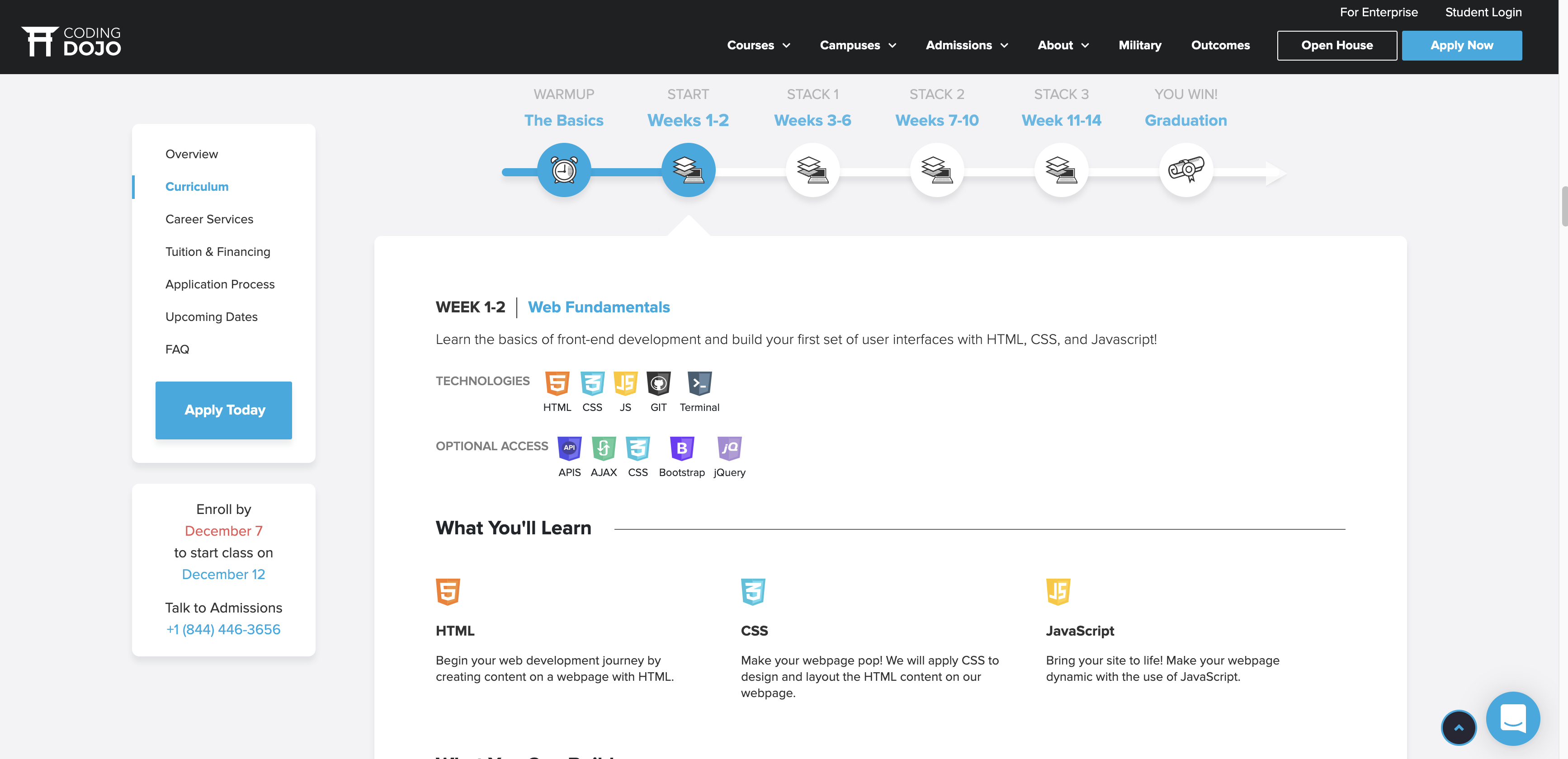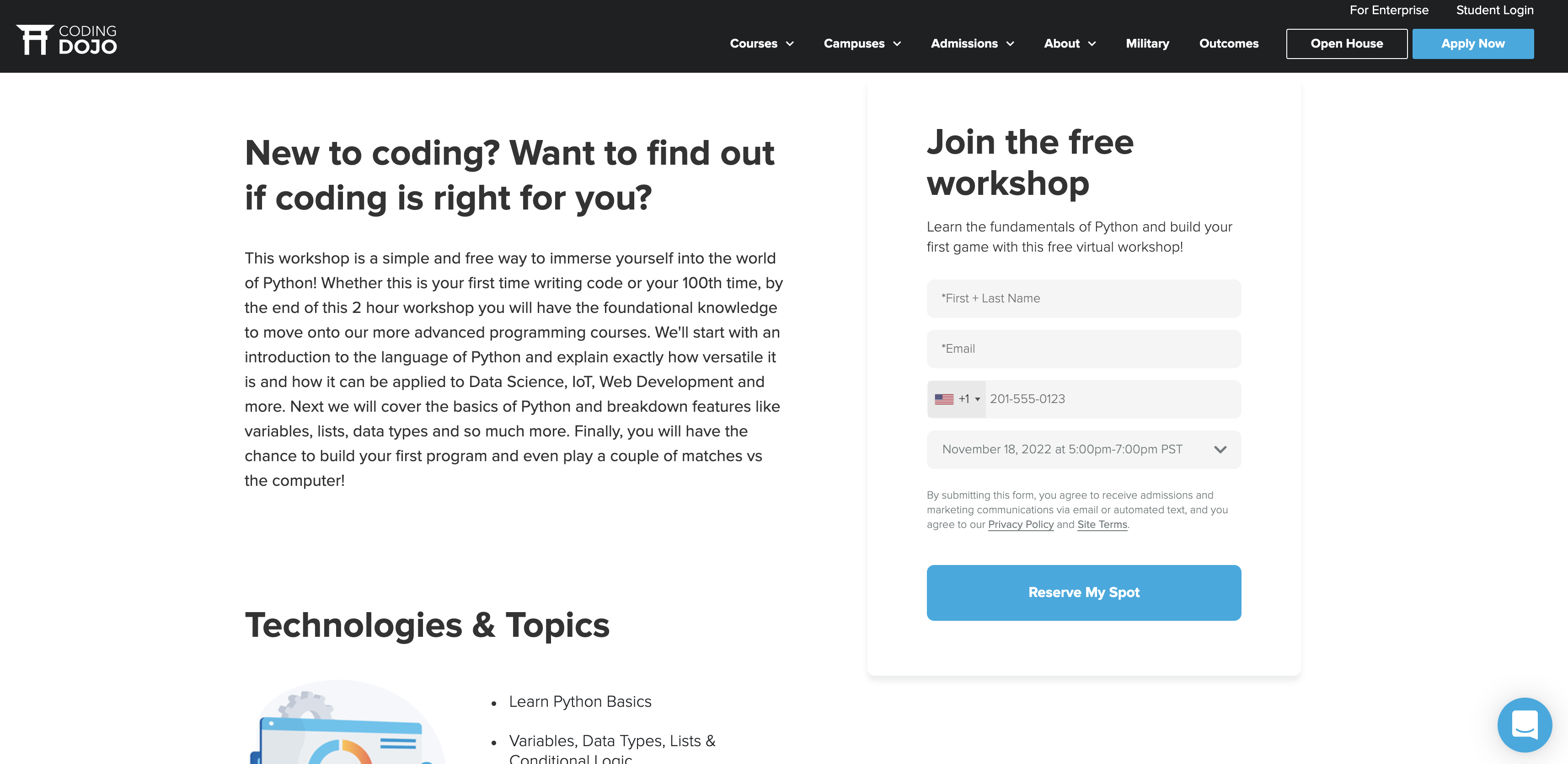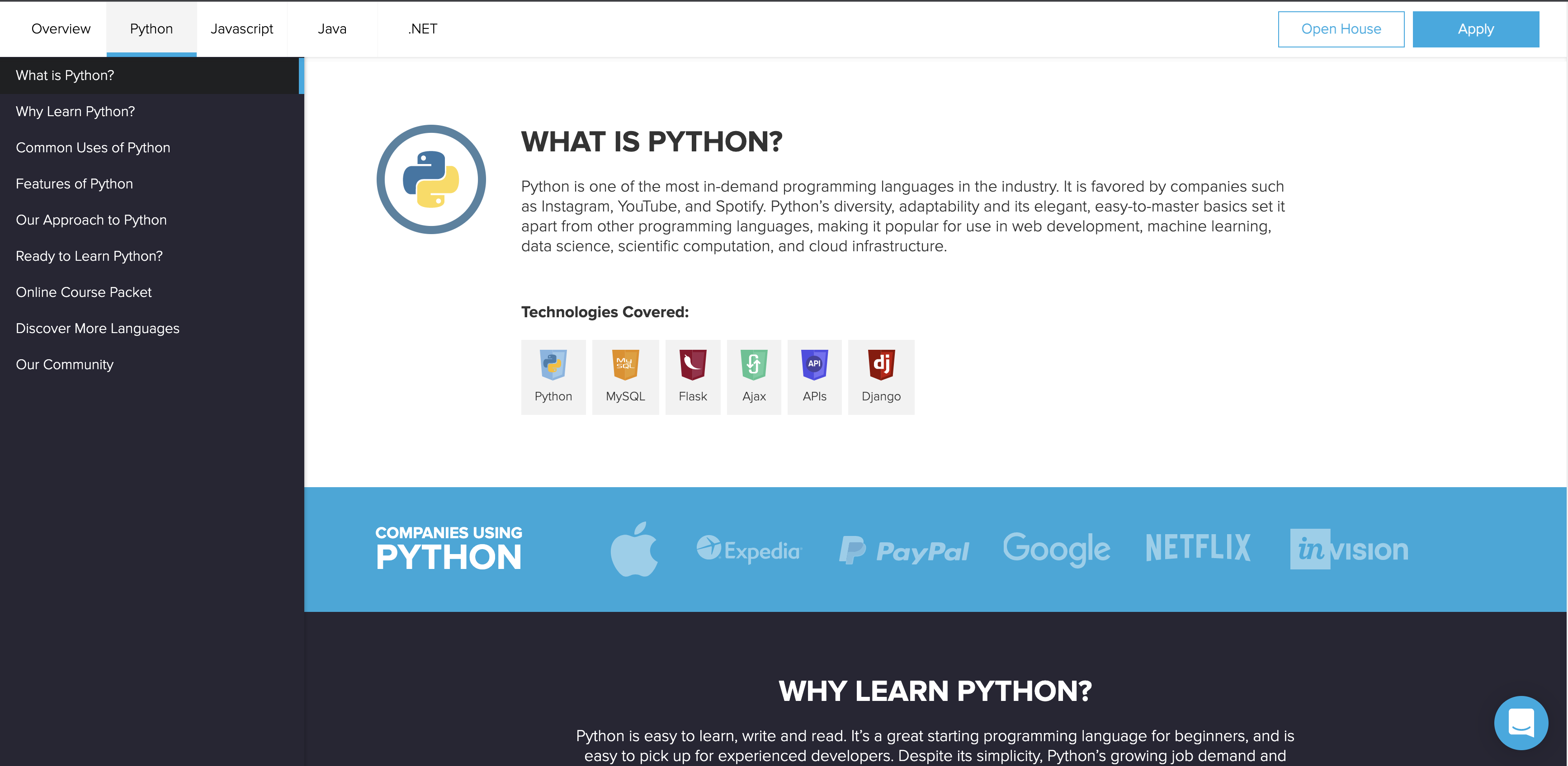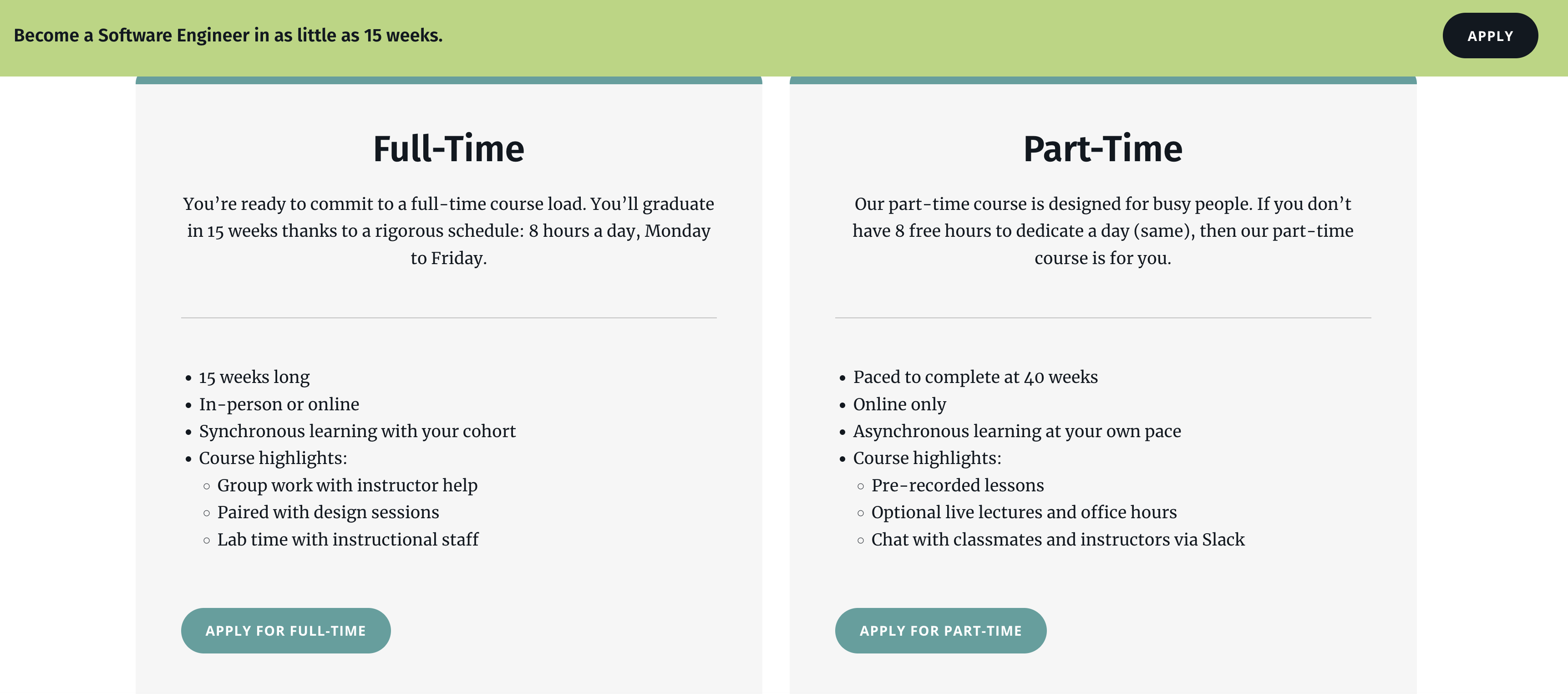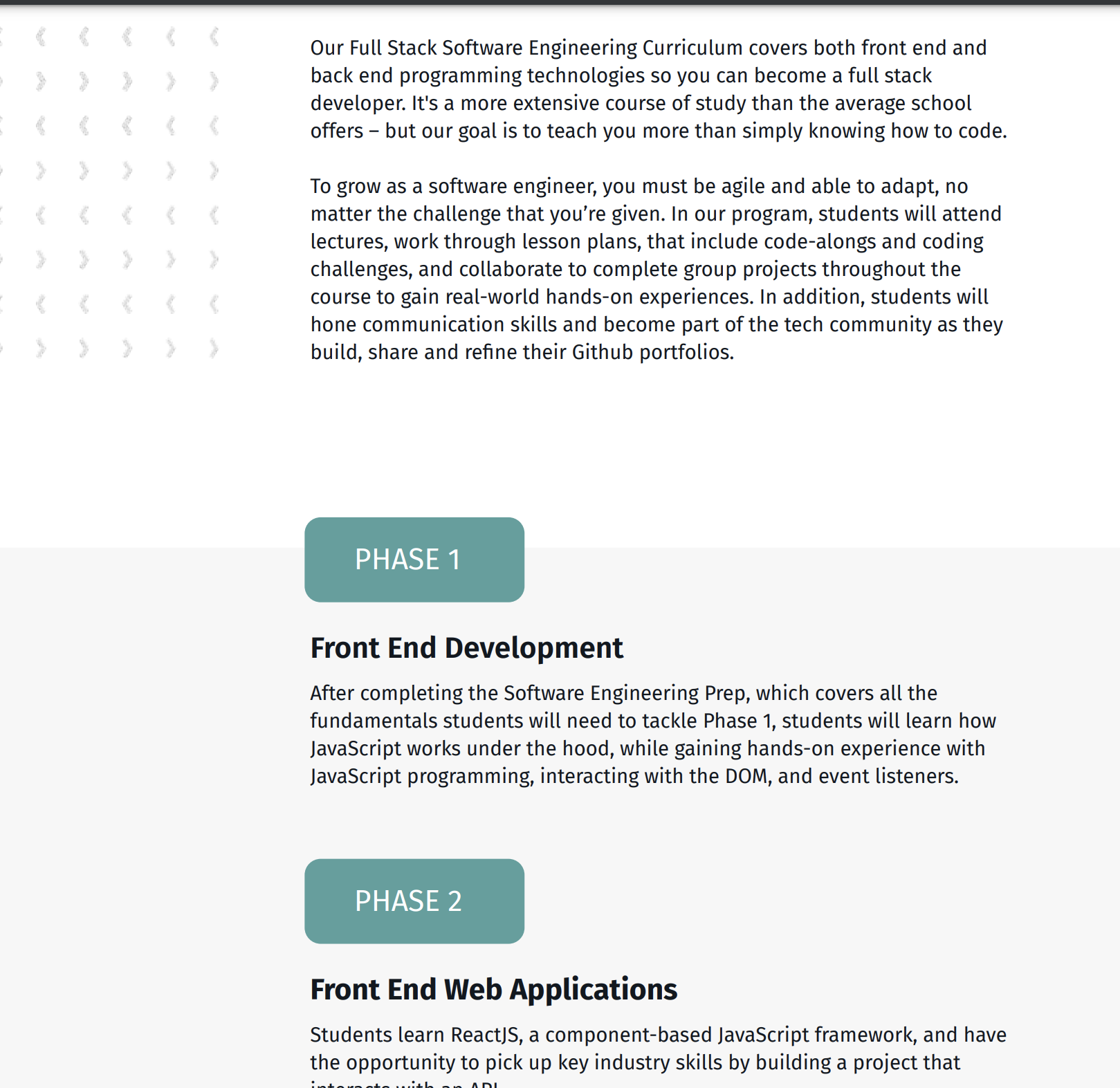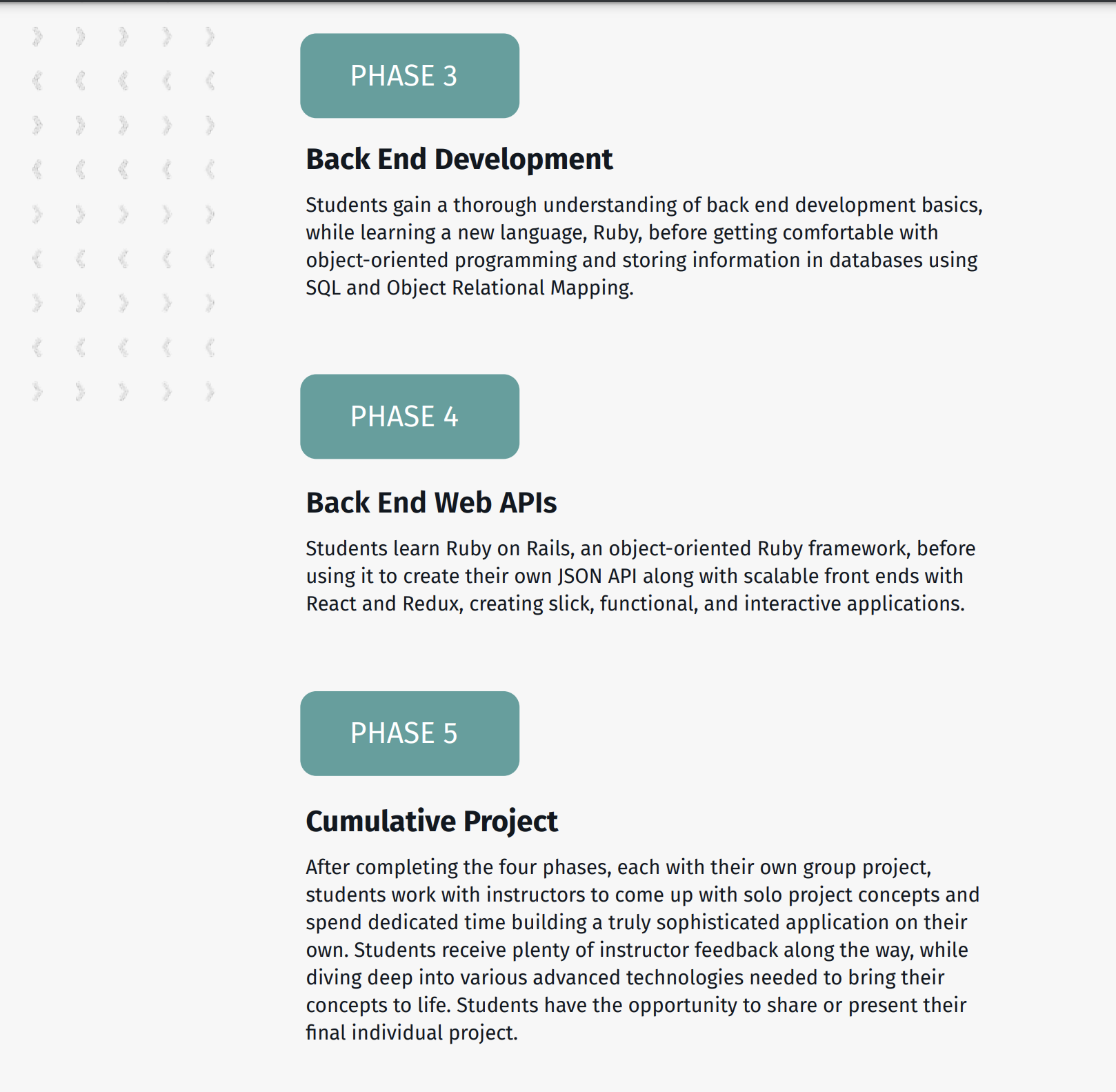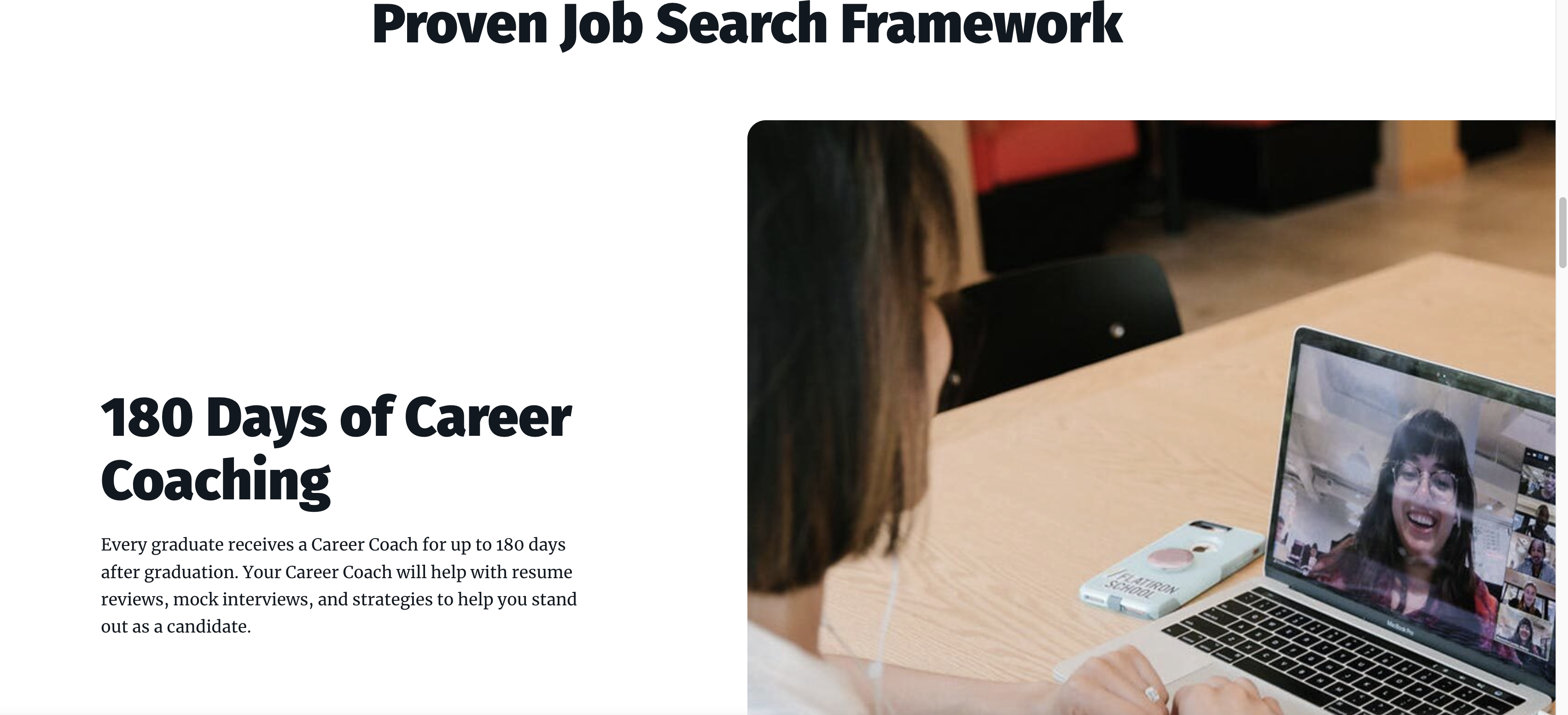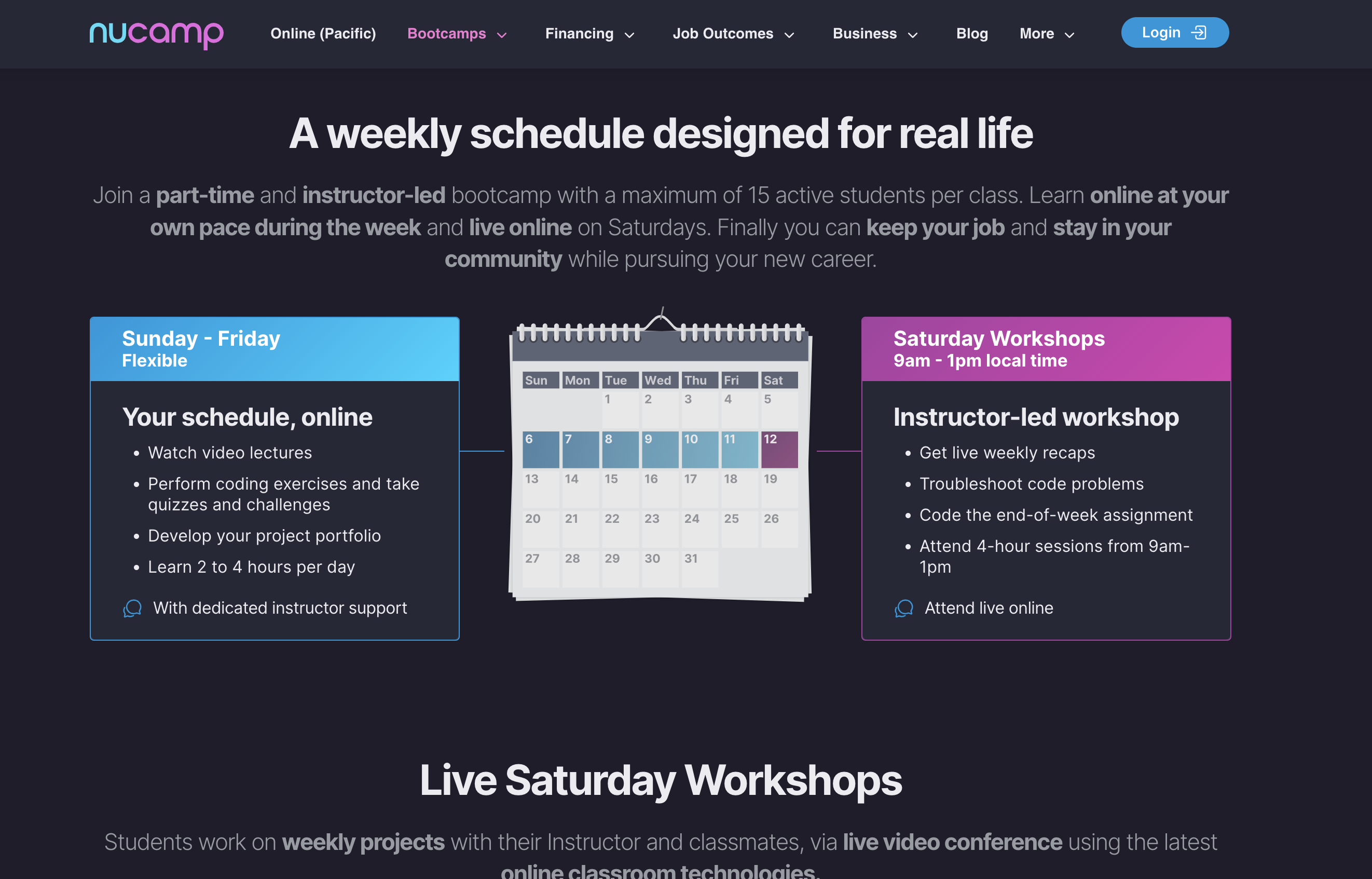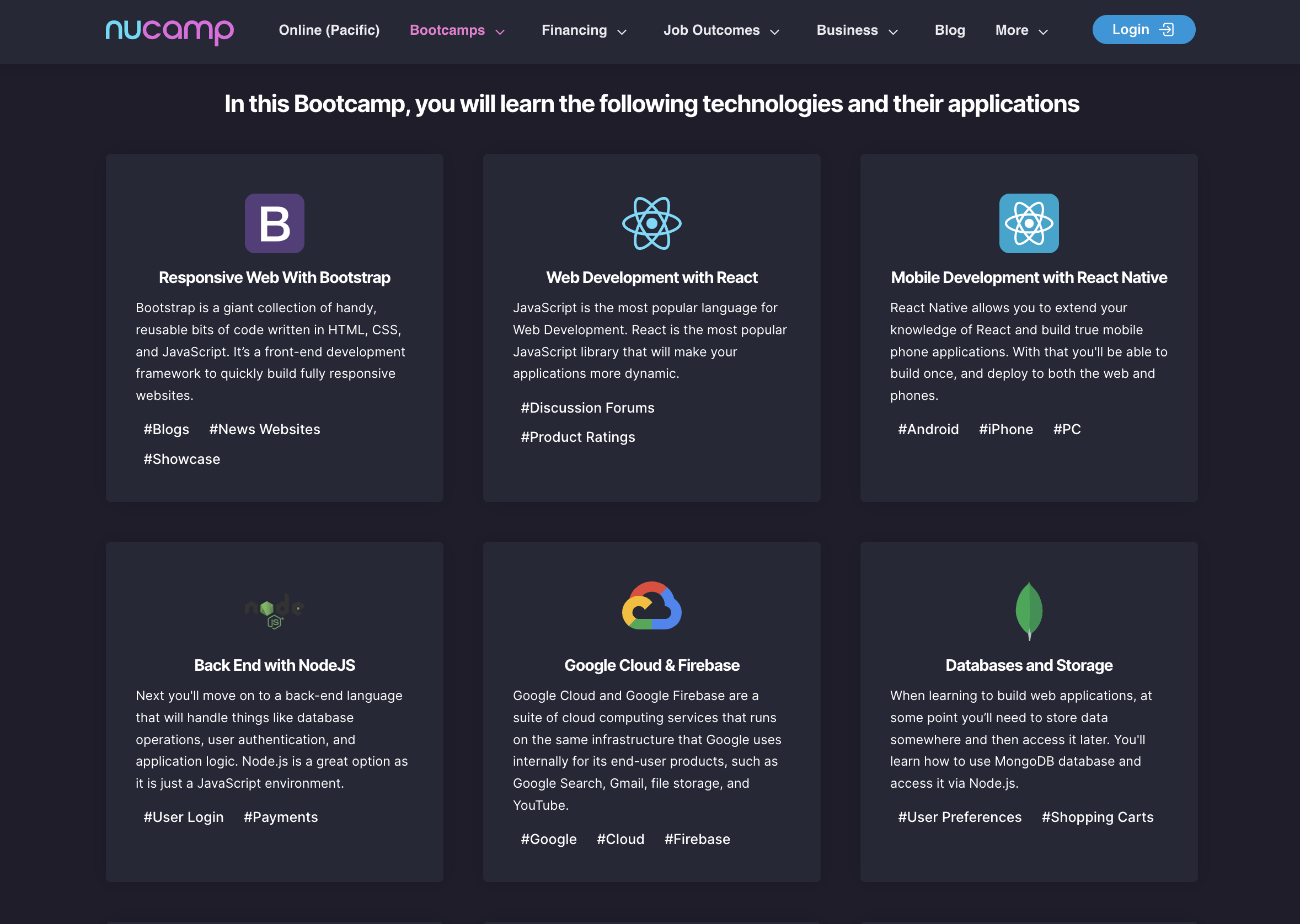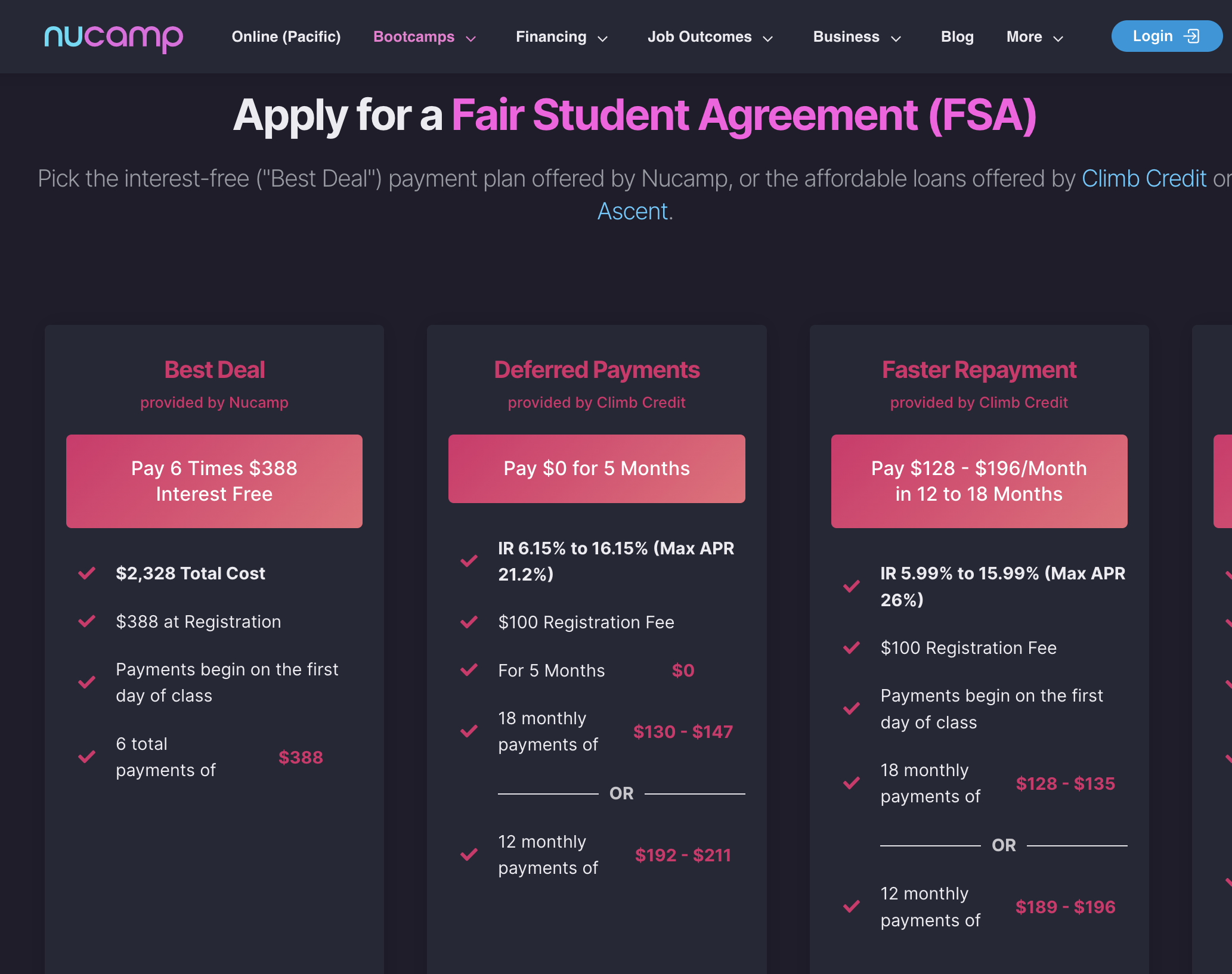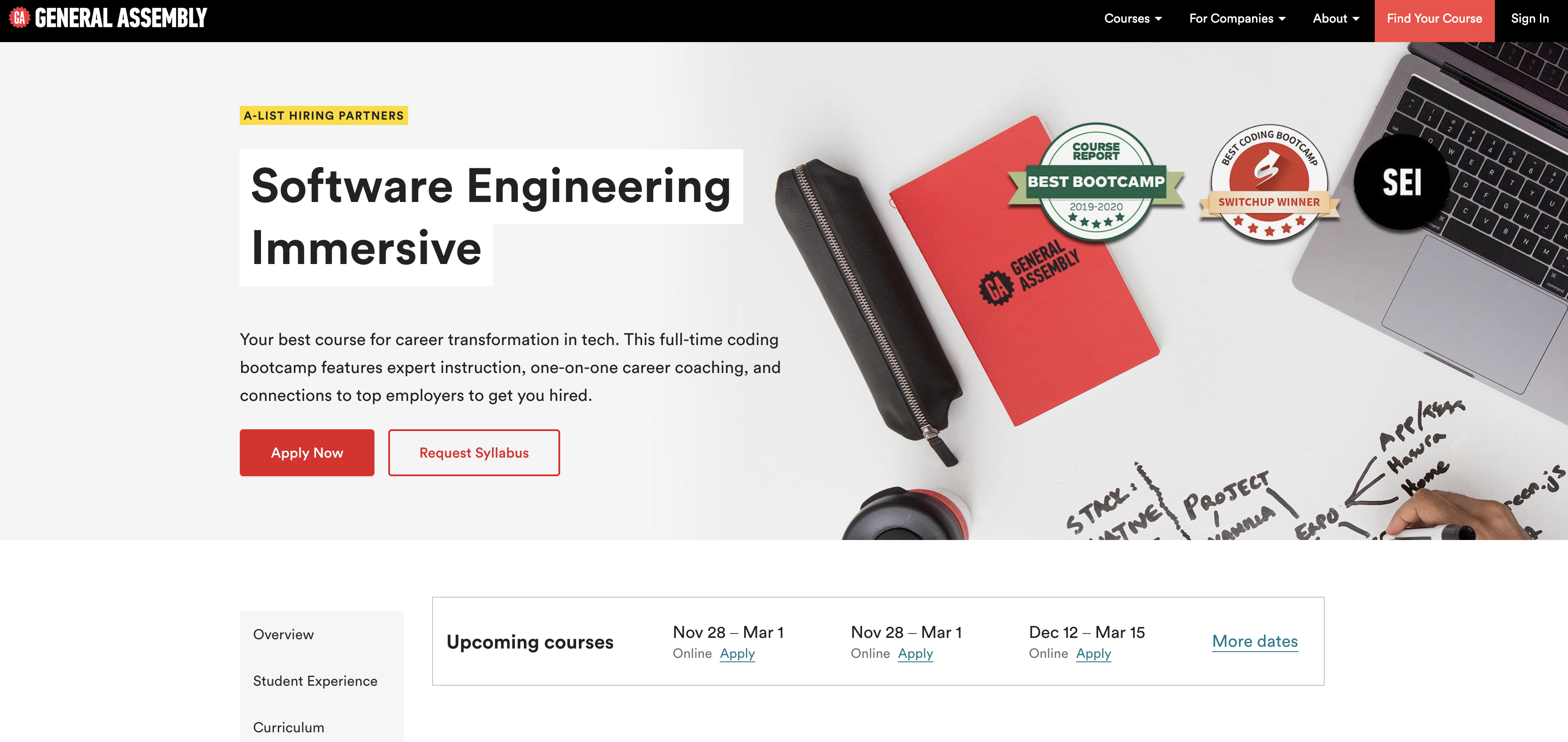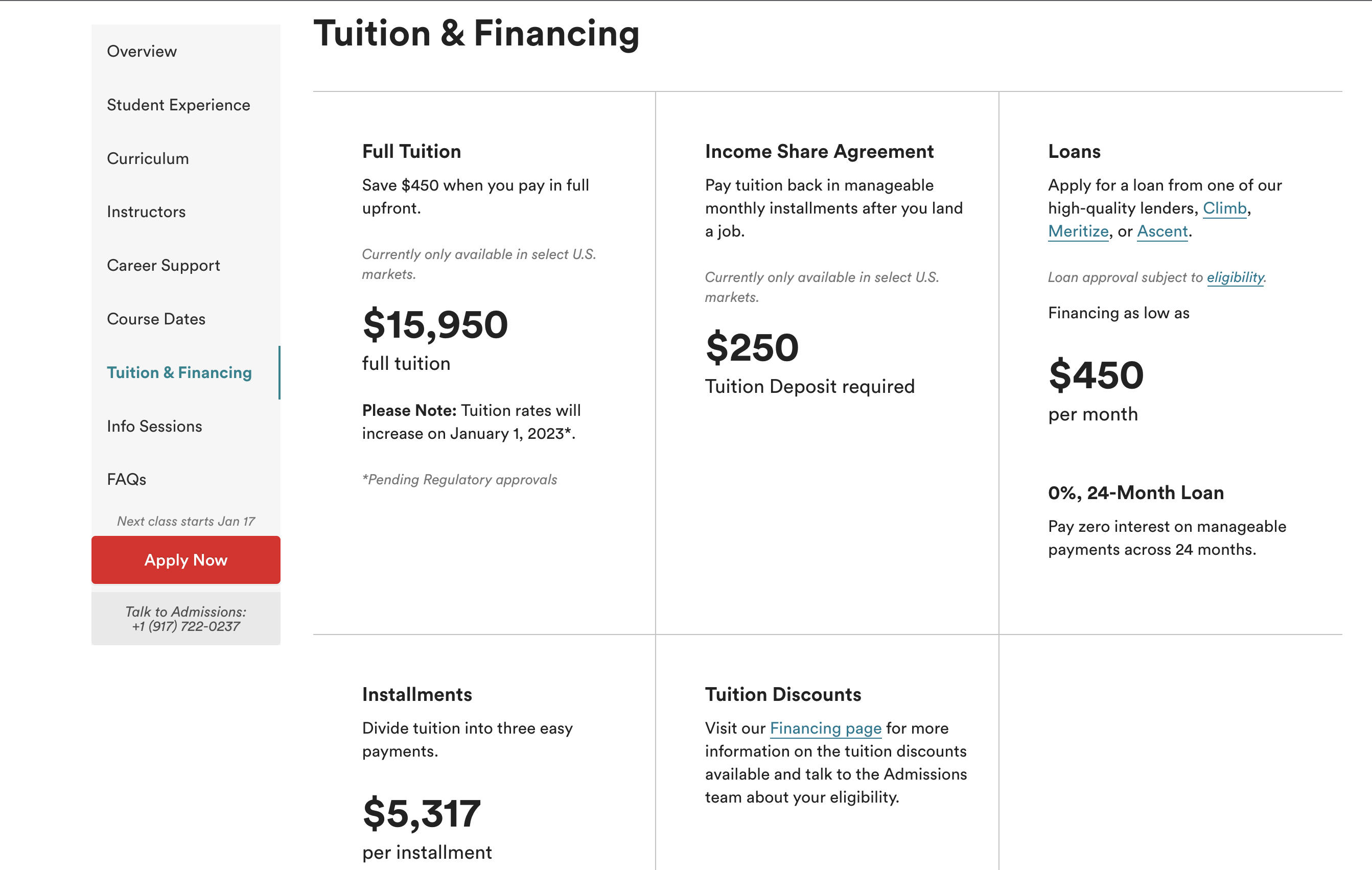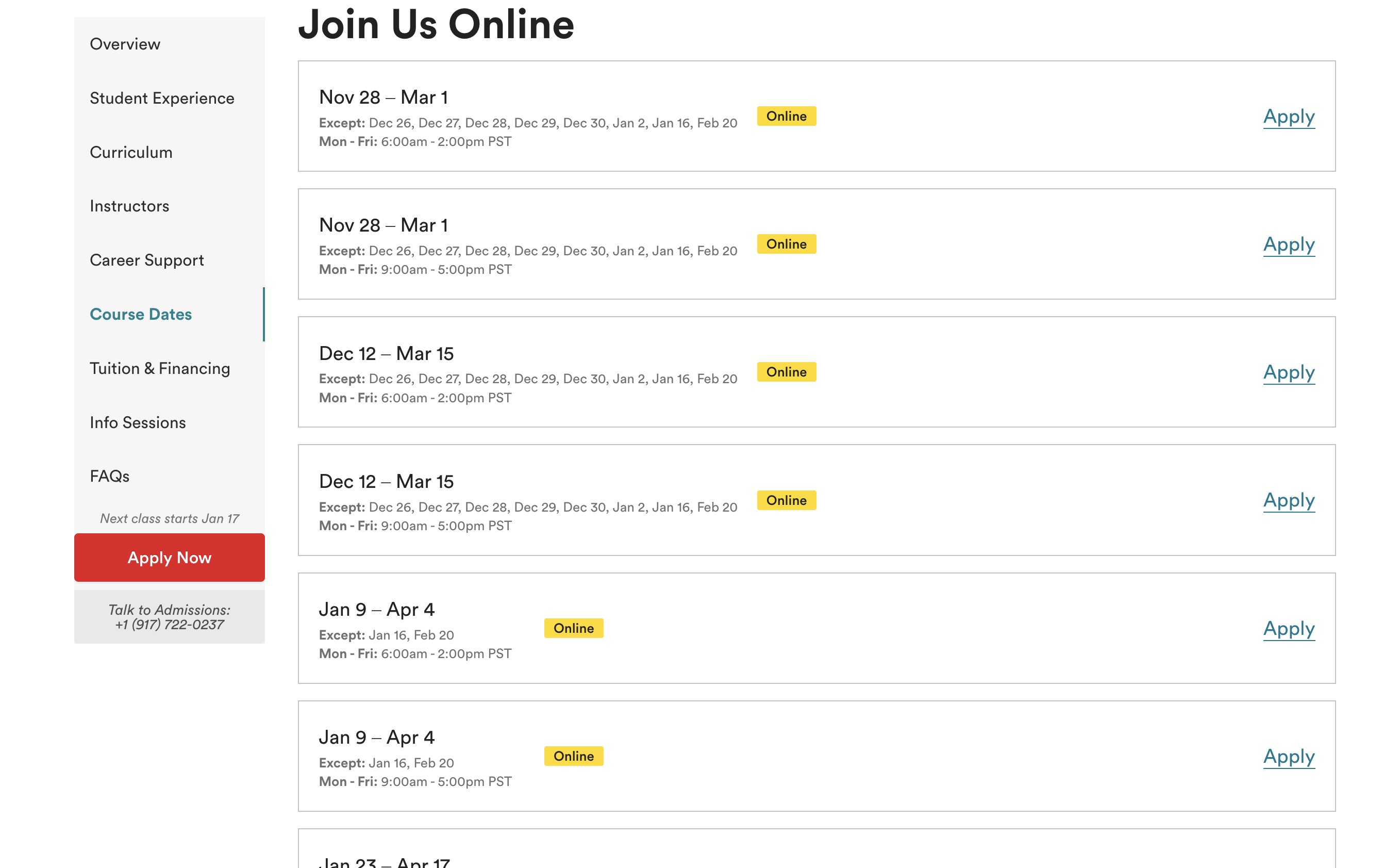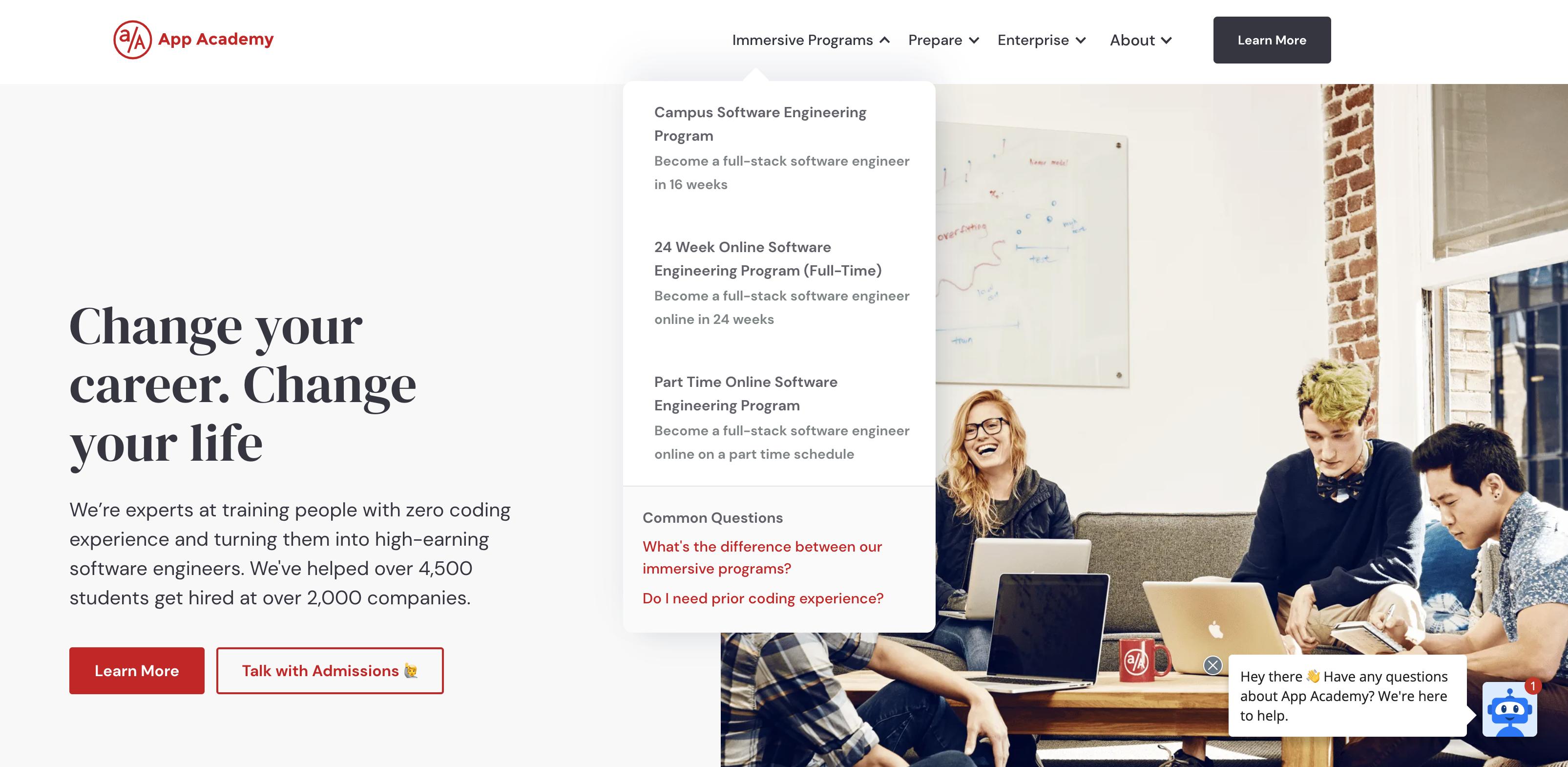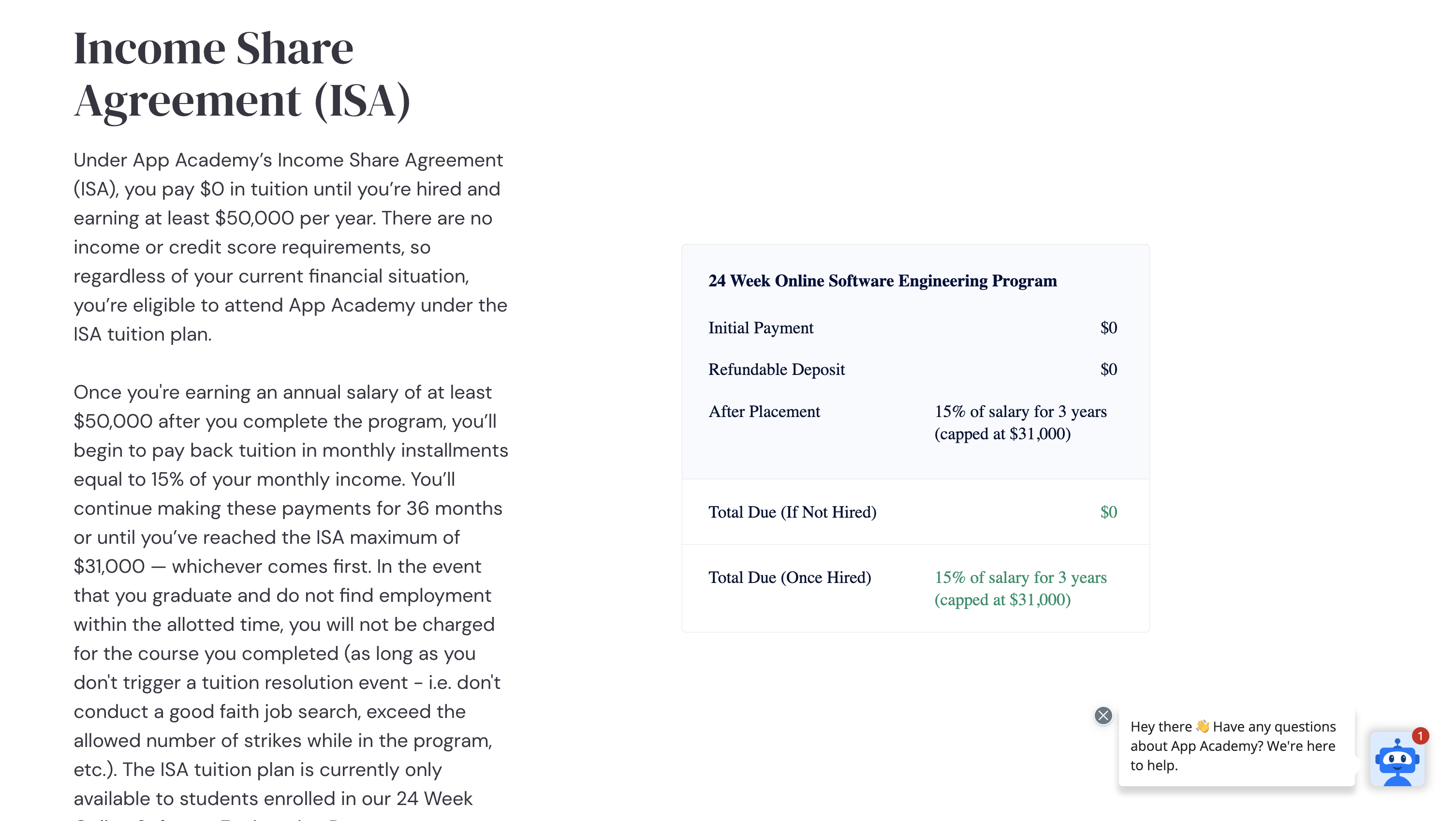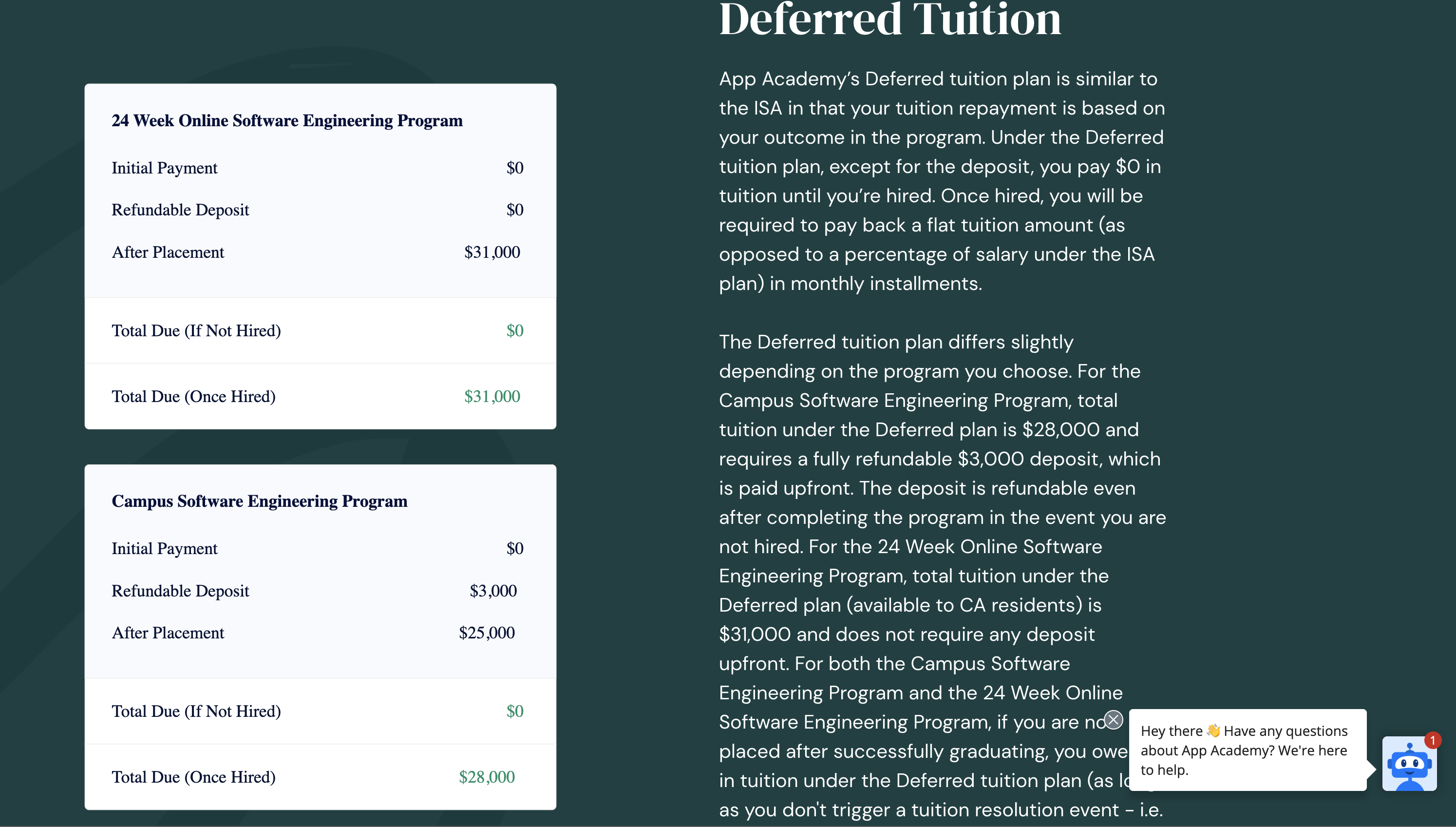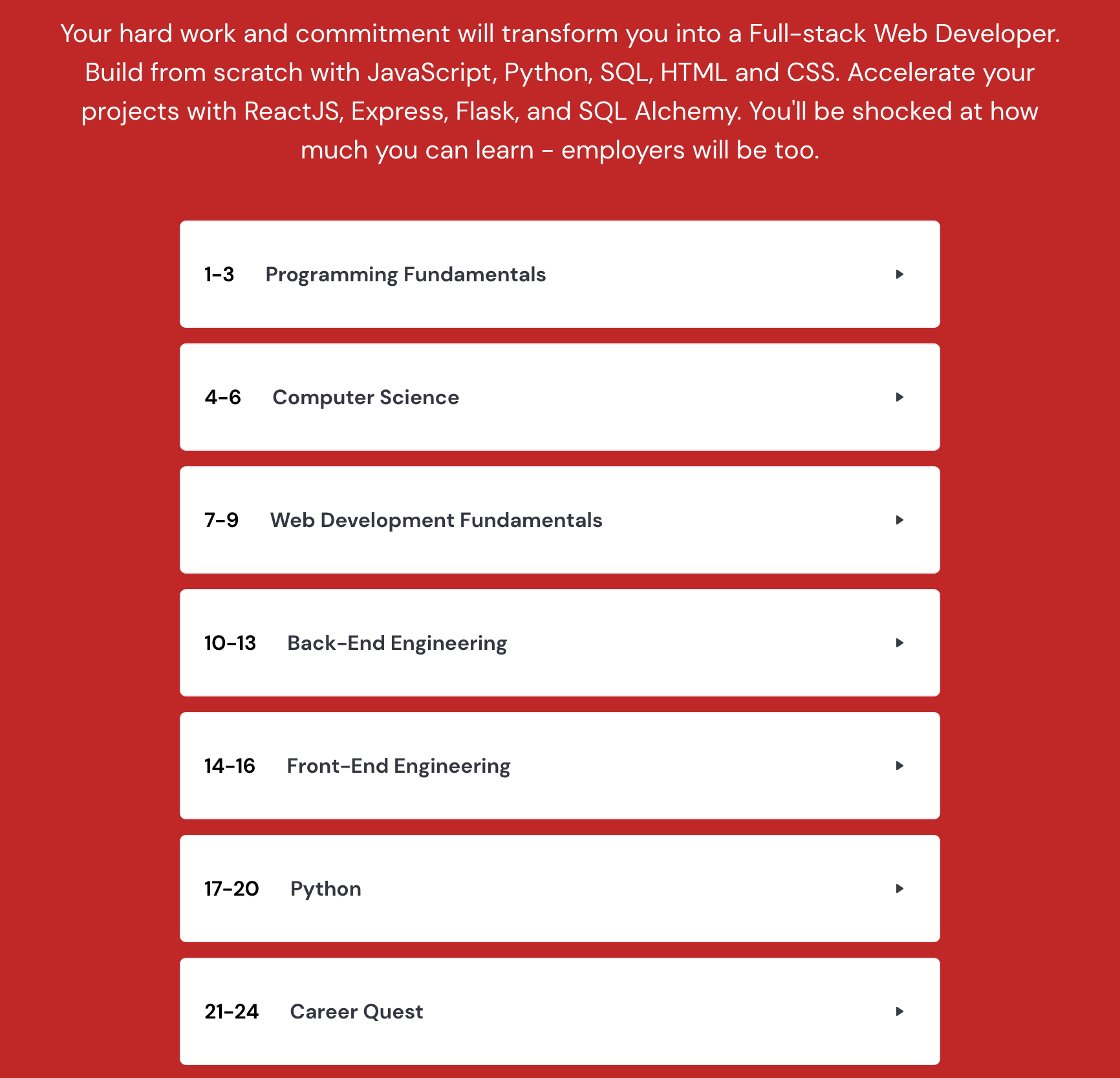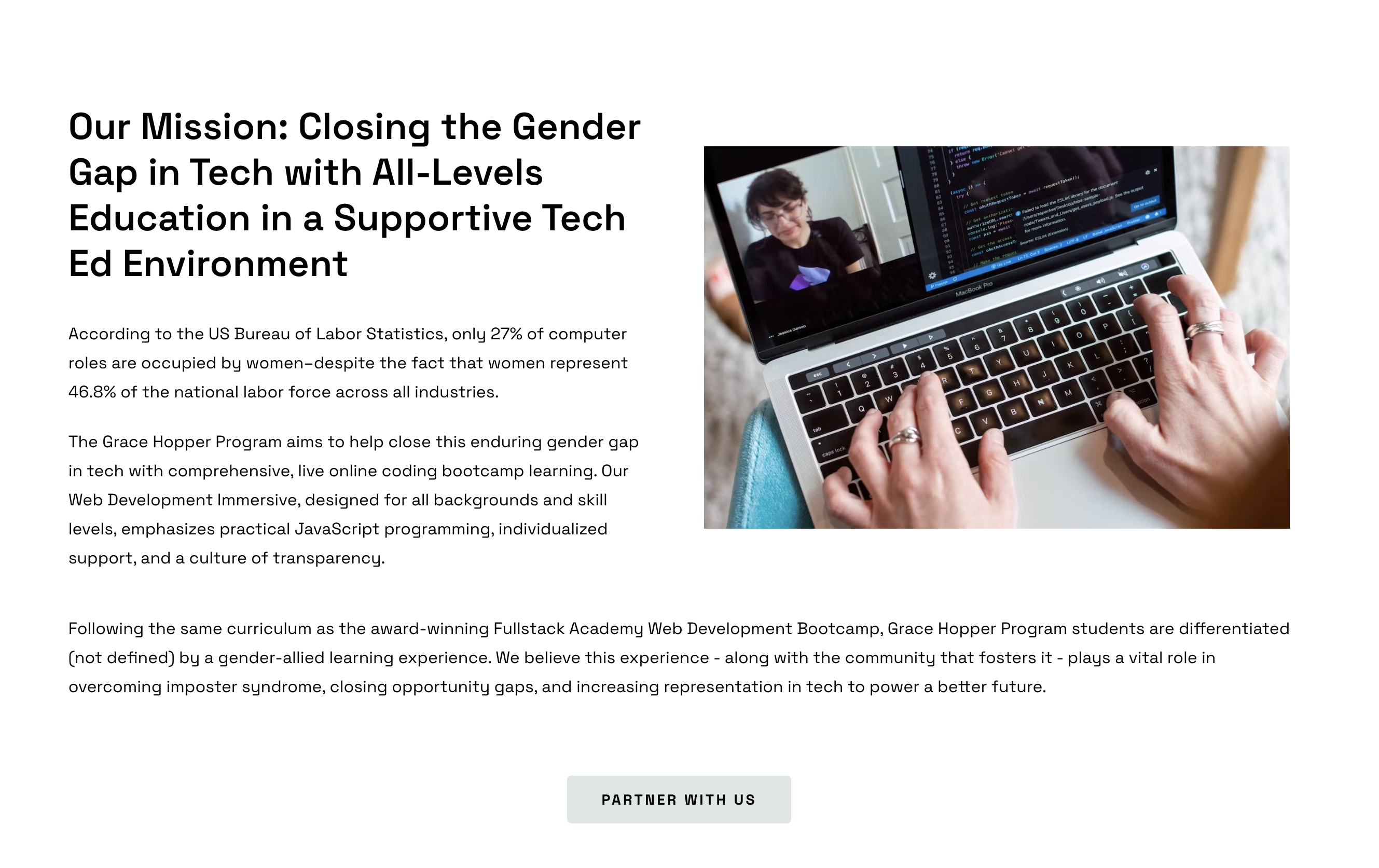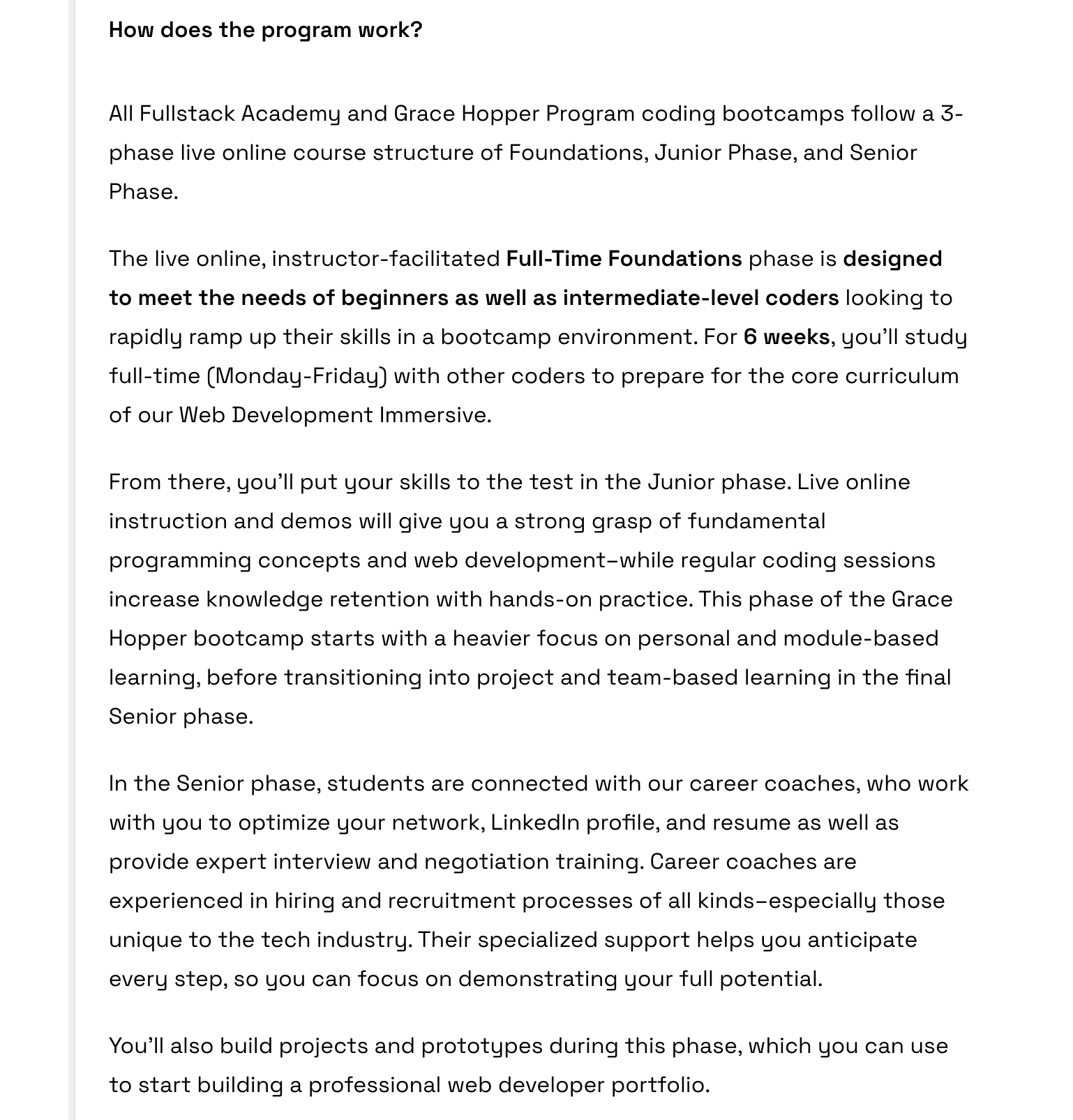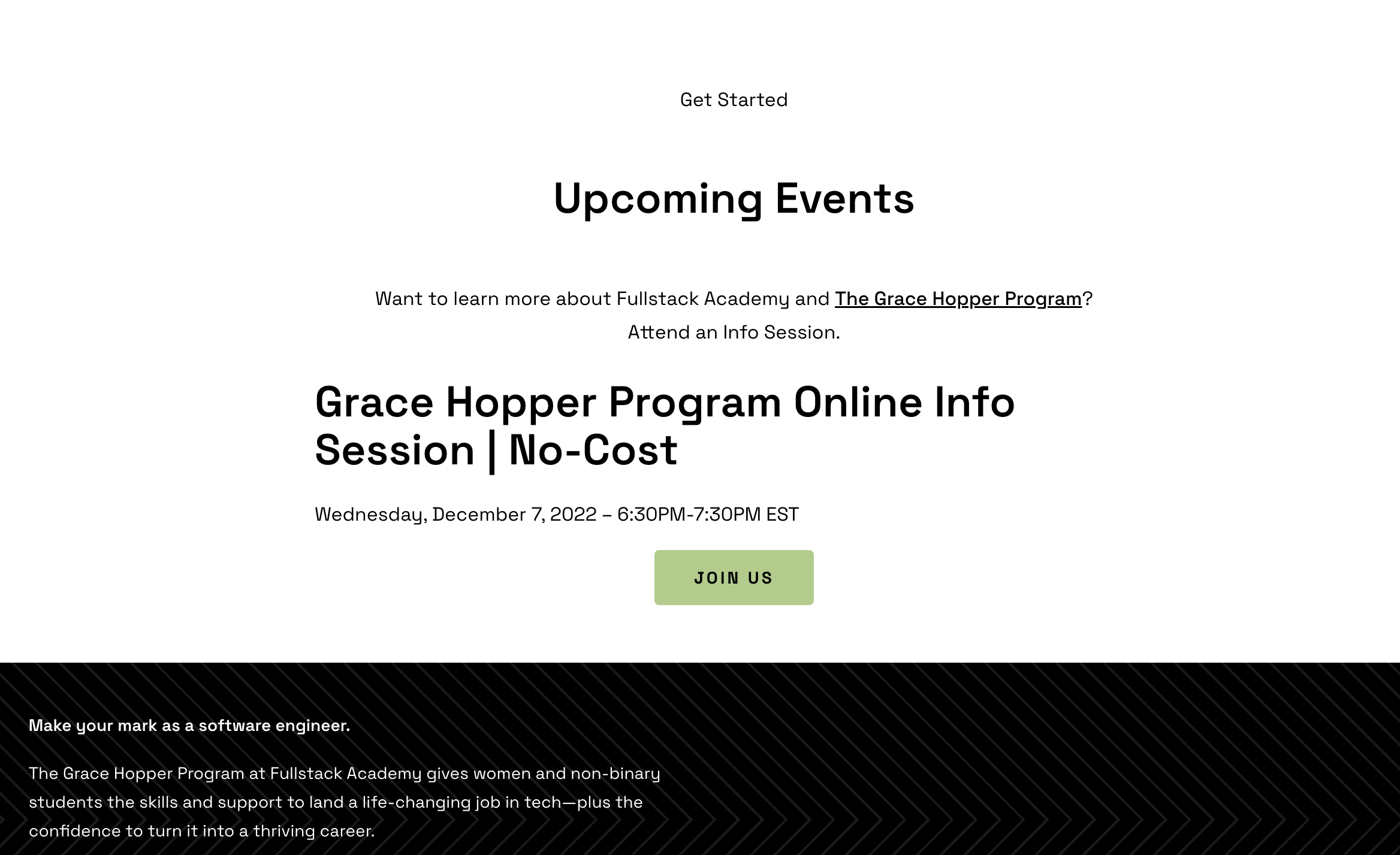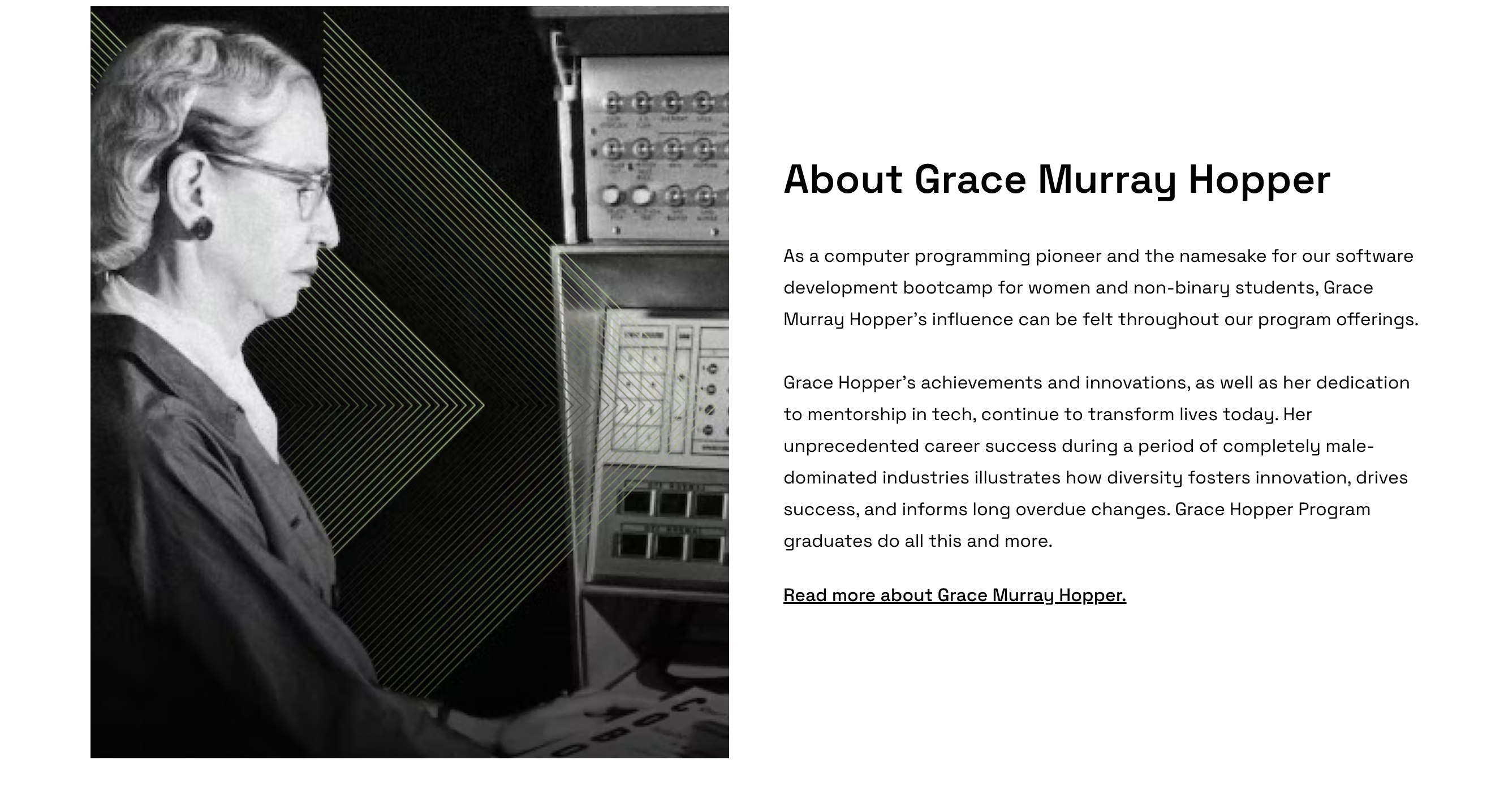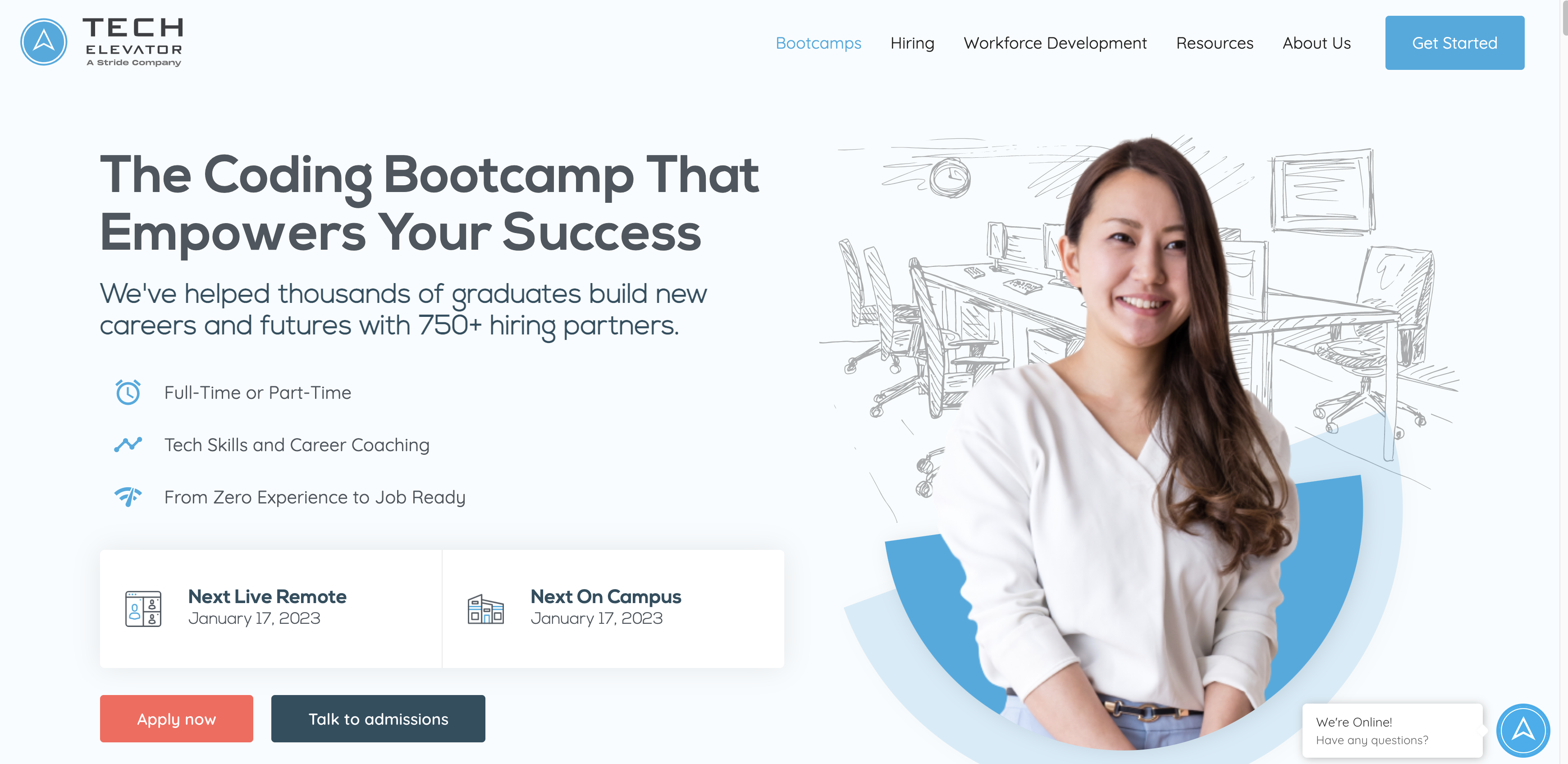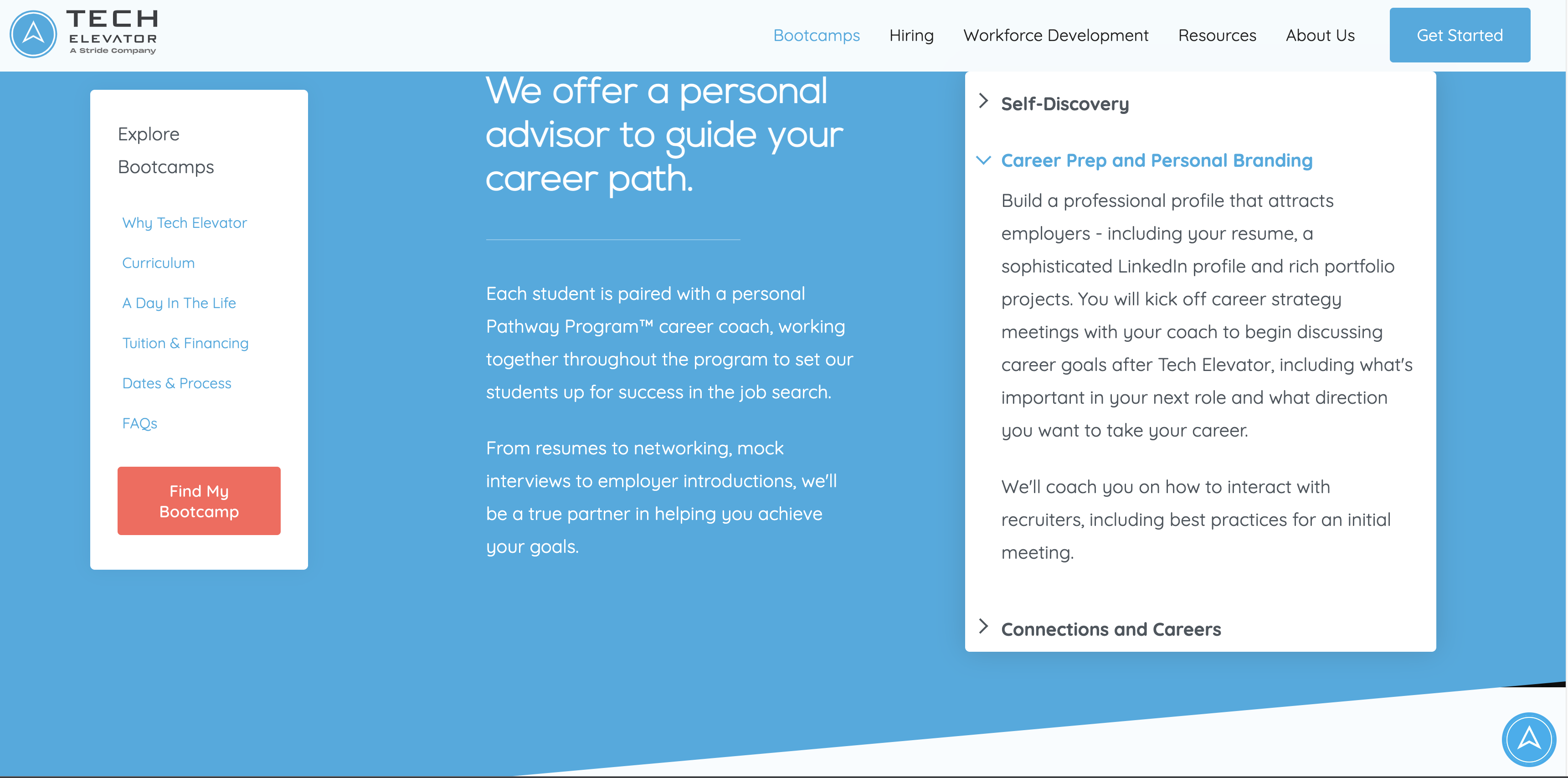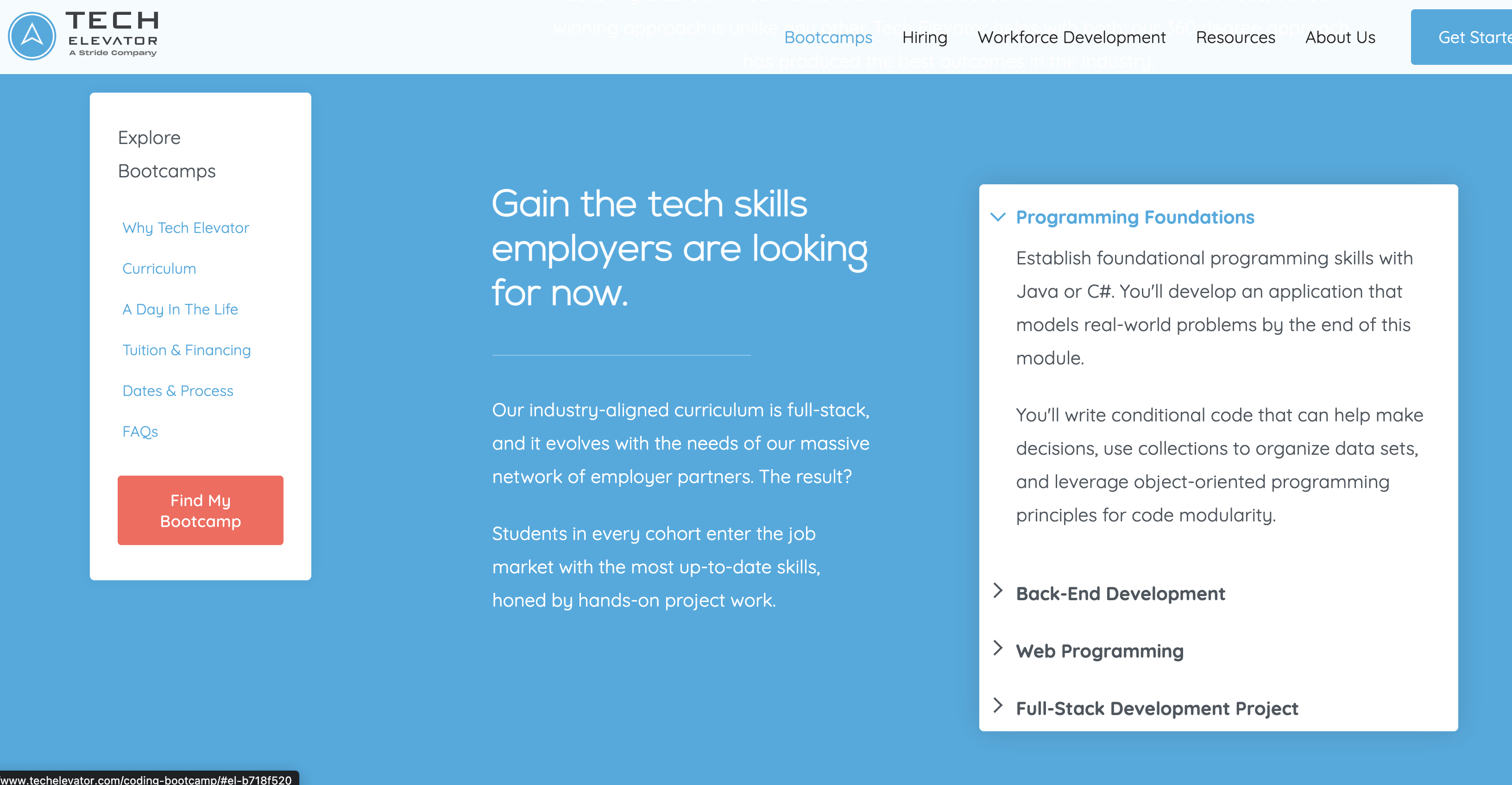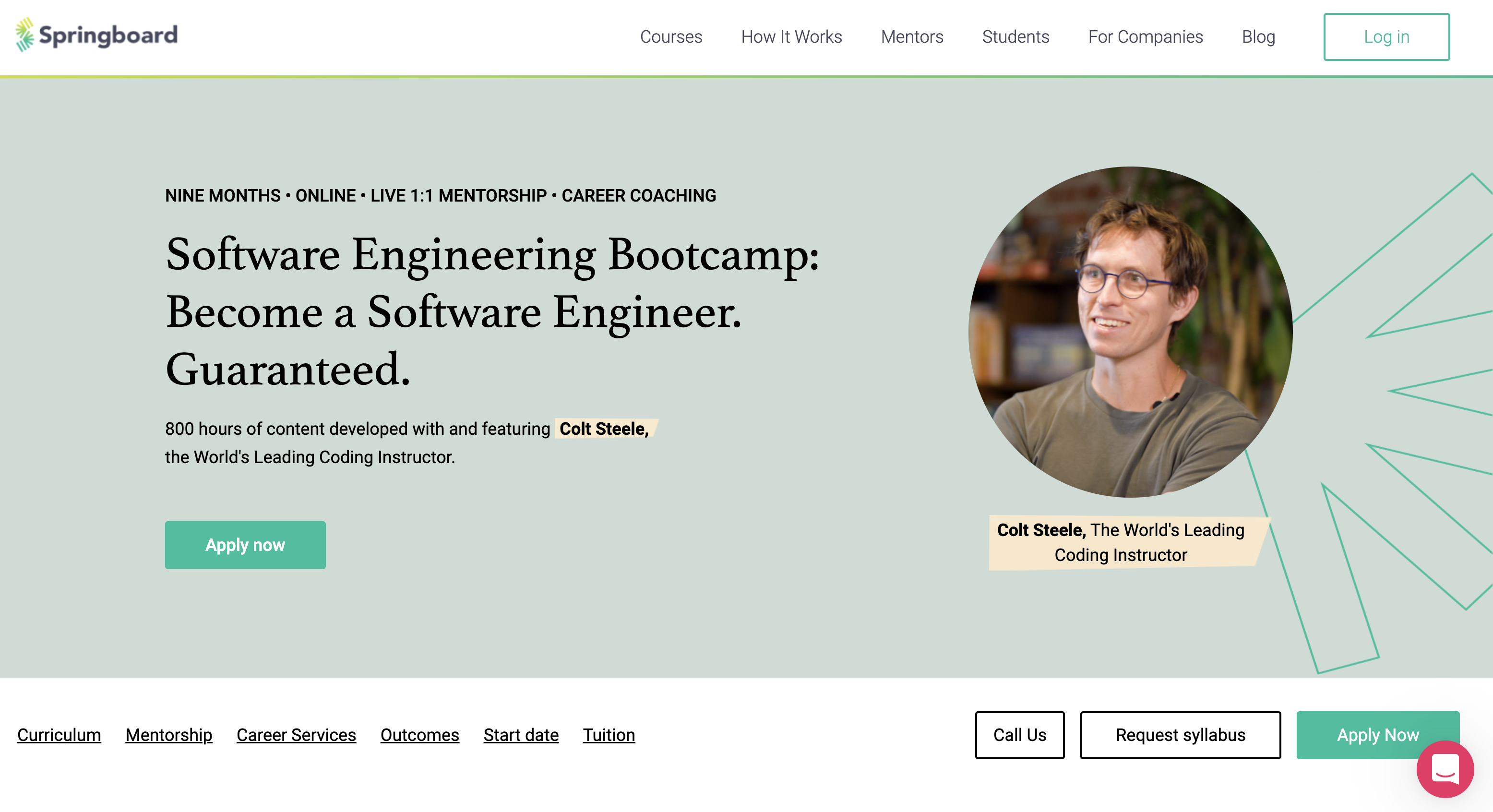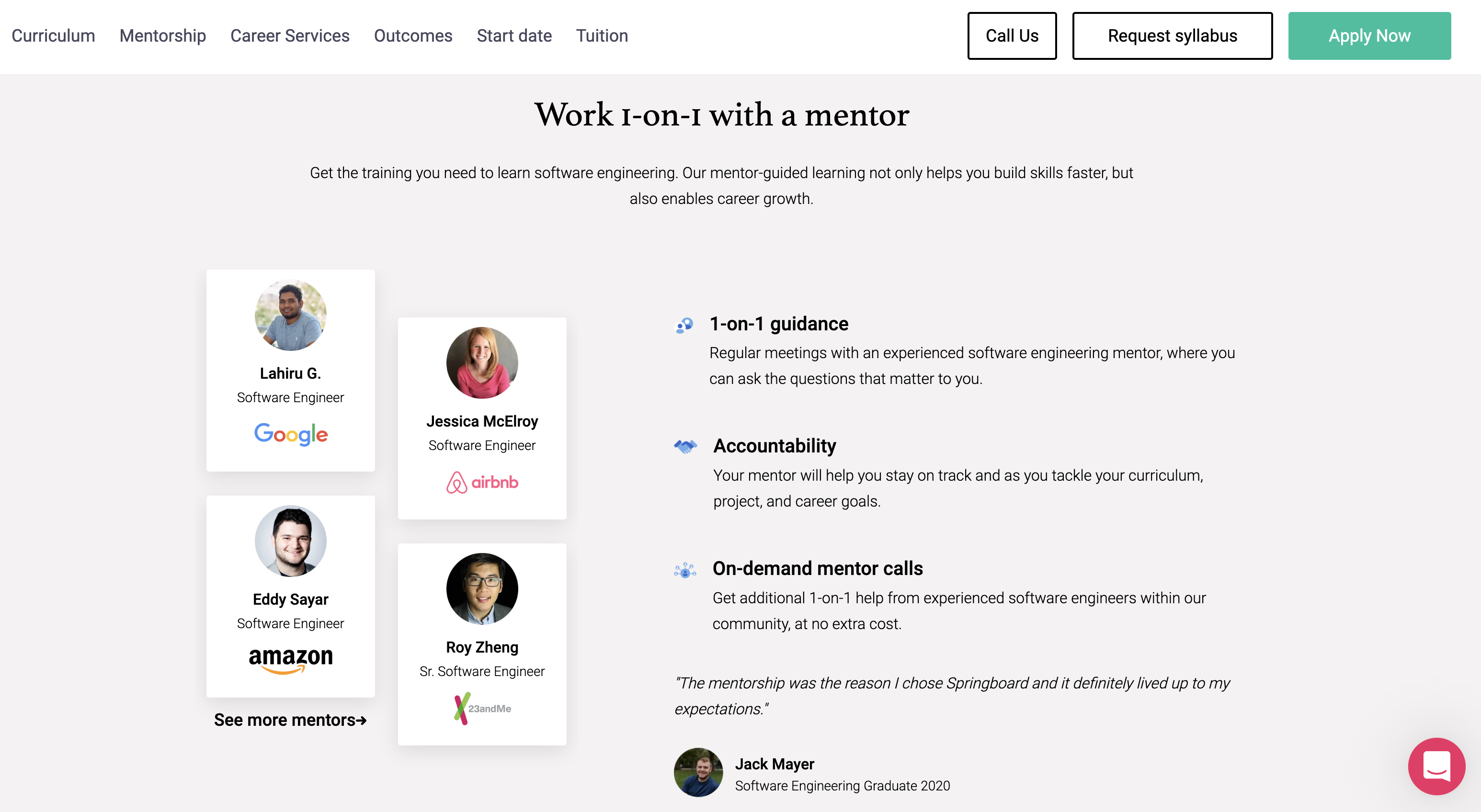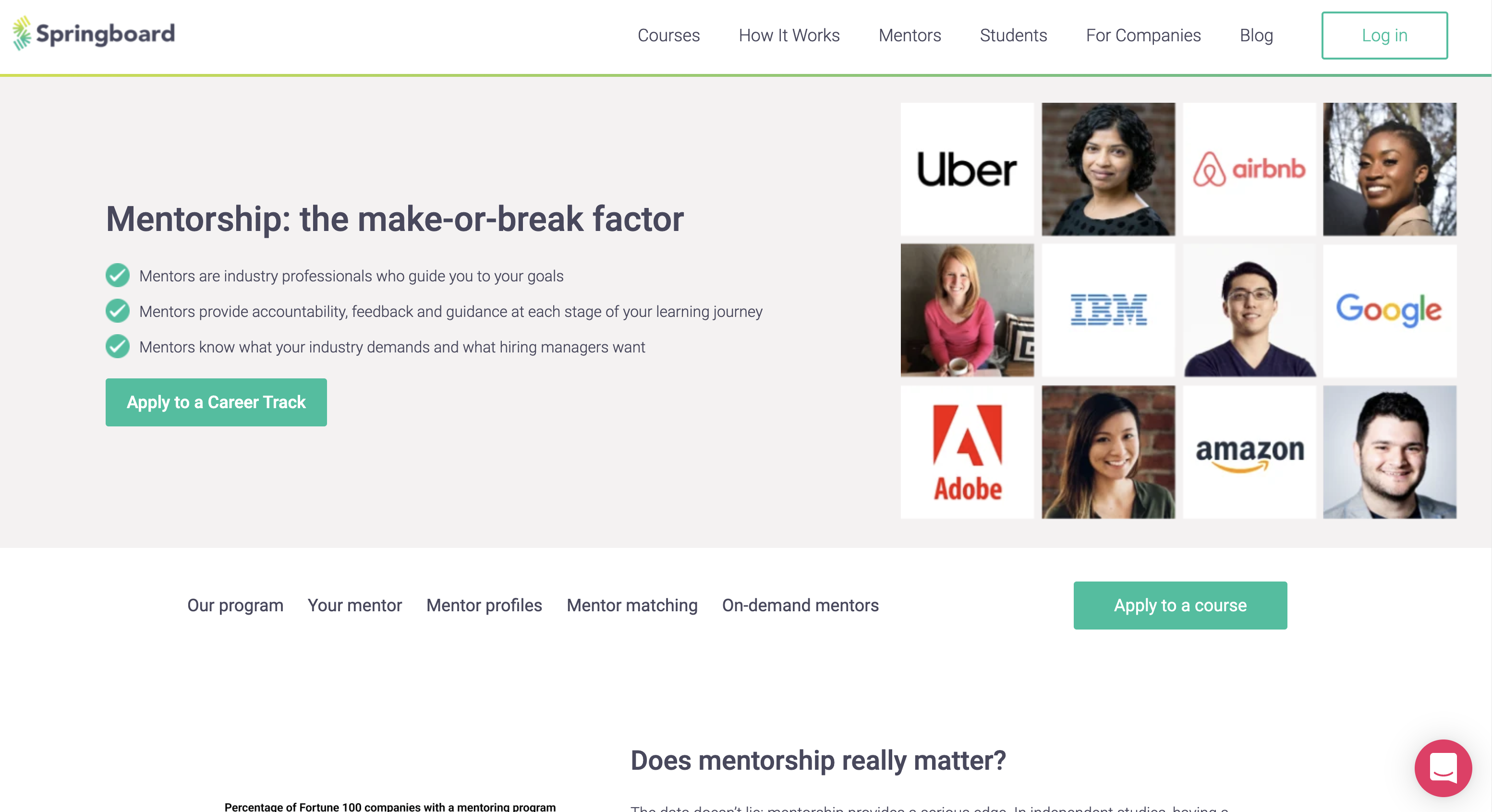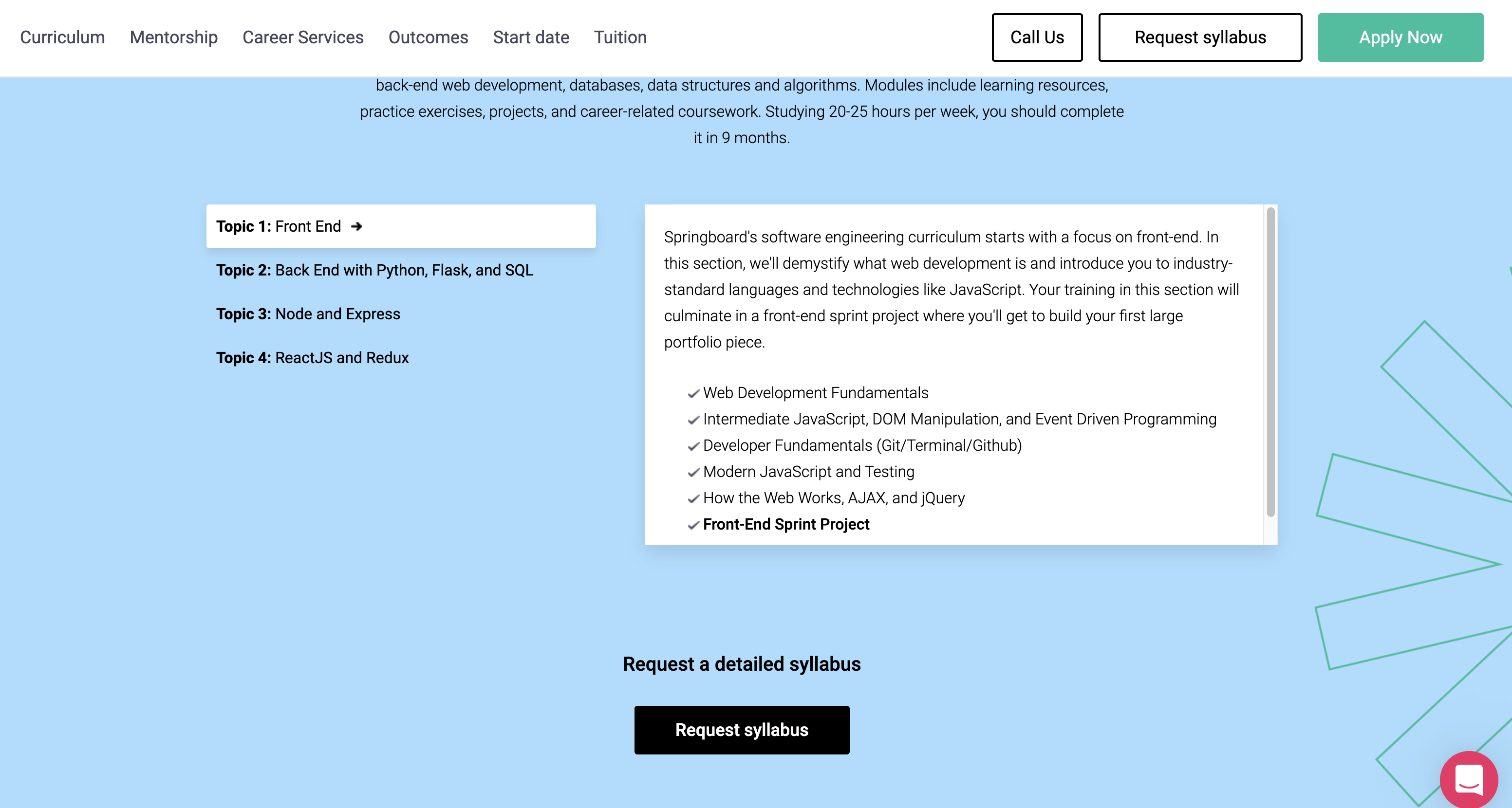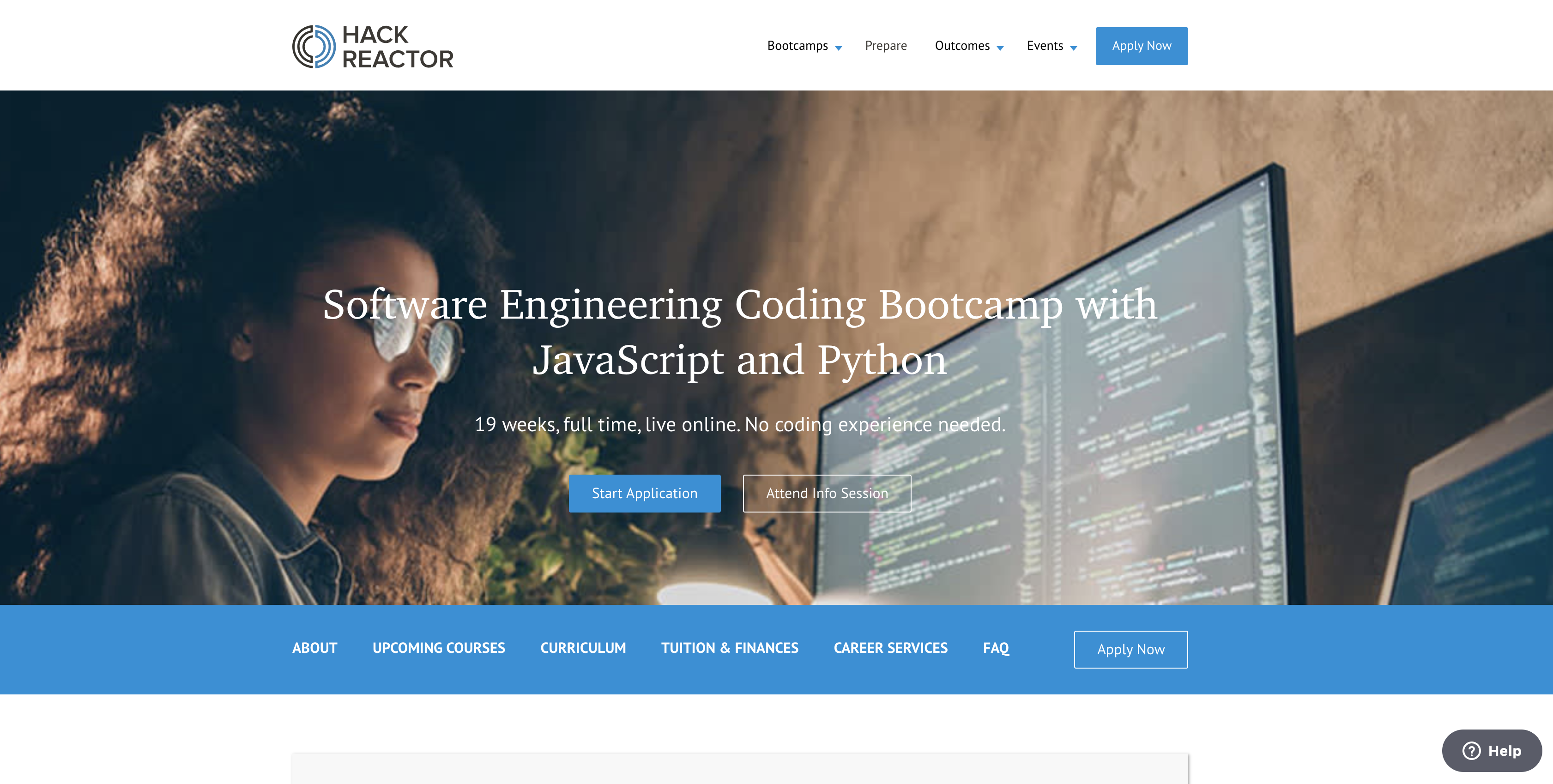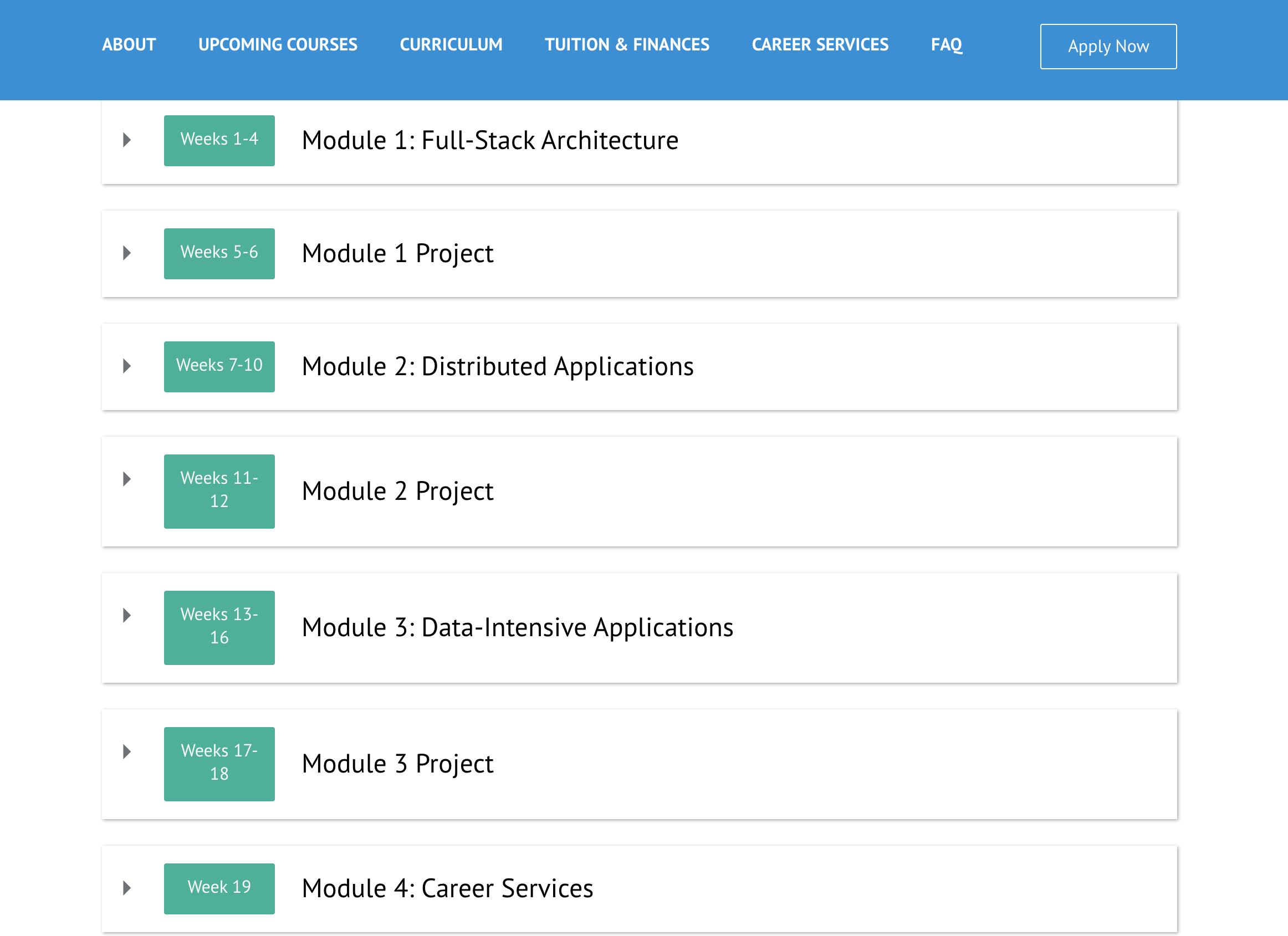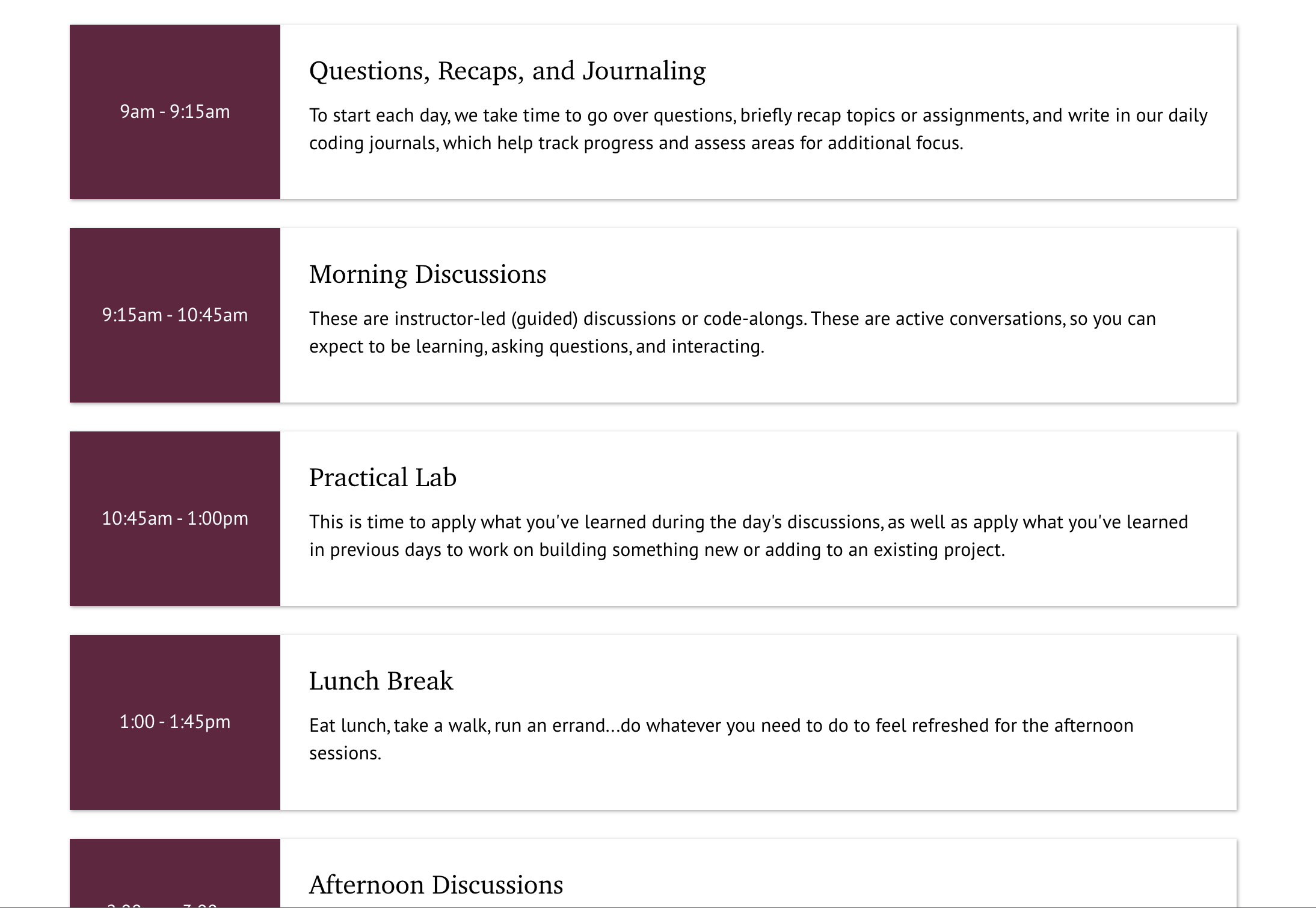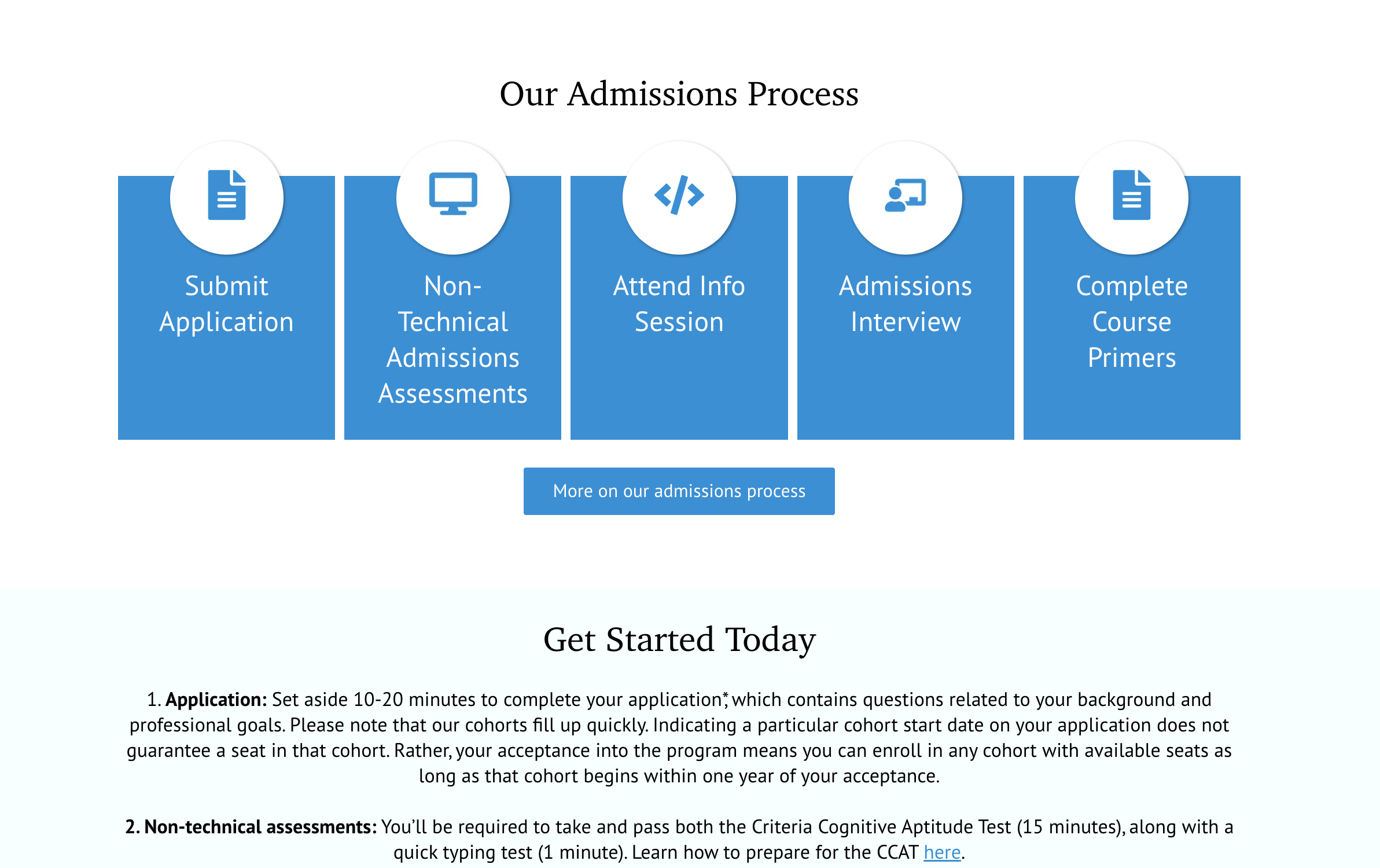Learning how to code can open up a lot of career opportunities. With a coding bootcamp, you’ll get the expert guidance you need to quickly learn new skills and land a high-paying job. But there are many options out there when it comes to these courses, so to make it easier, we’ve reviewed the top coding bootcamps below to help you select the program that’s most worth your time and money.
Top 9 Coding Bootcamps
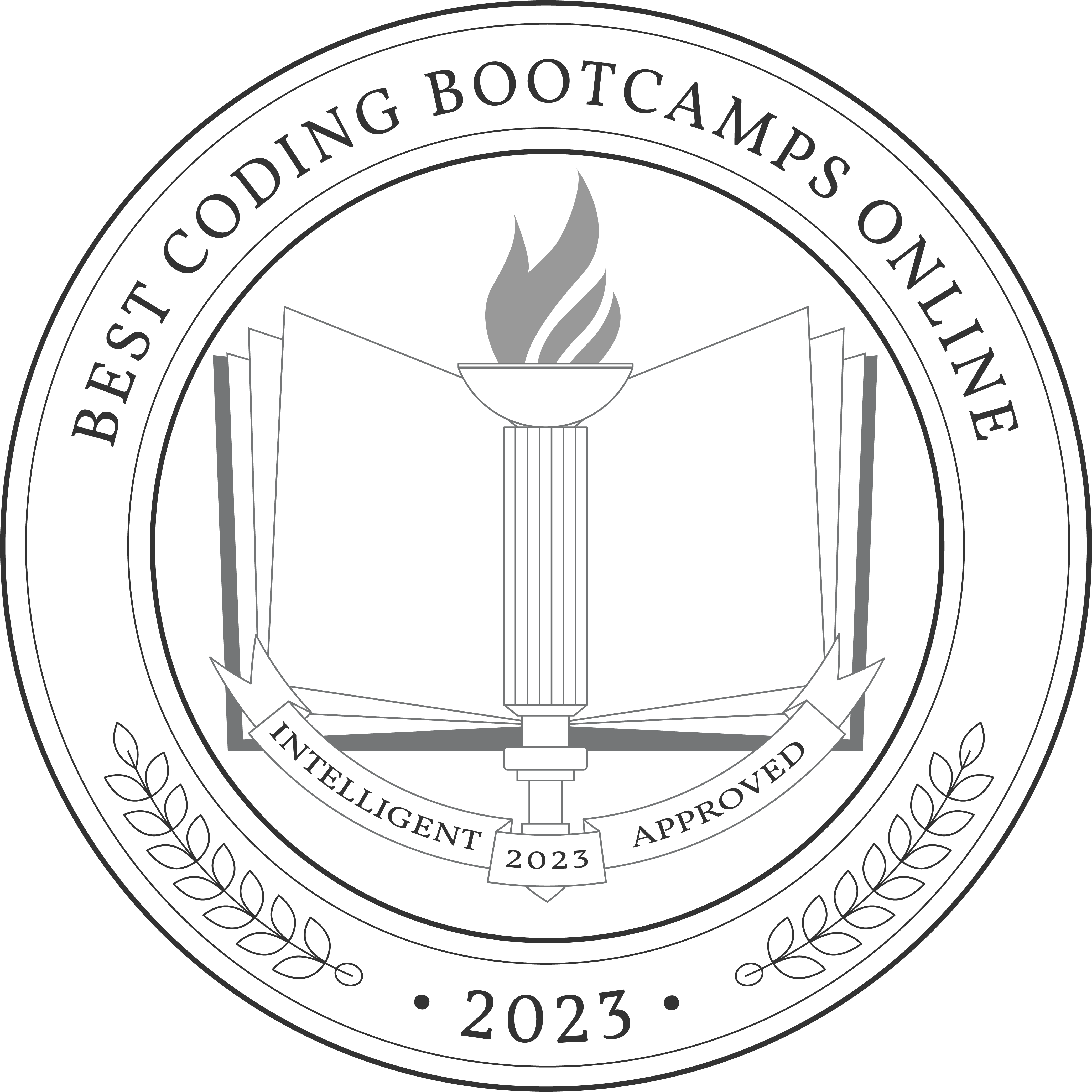
- Coding Dojo: Full-time Remote Software Engineering Bootcamp – Best Overall
- Flatiron School: Software Engineering Bootcamp – Best Self-Paced Course
- NuCamp: Full Stack + Web Development Bootcamp – Most Flexible
- General Assembly: Software Engineering Immersive Course – Best Payment Options
- App Academy: Software Engineering Bootcamp – Best ISA Program
- Fullstack Academy: Grace Hopper Live Online Coding Bootcamp – Best Inclusivity Program
- Tech Elevator: National Live Remote Coding Bootcamp – Best Career Prep
- Springboard: Software Engineering Bootcamp – Best Mentorship Program
- Hack Reactor: Software Engineering Coding Bootcamp w/ JavaScript & Python – Best Basic Course
How We Chose the Best Coding Bootcamps
To create our list of the best coding bootcamps, we started with a list of more than two dozen coding bootcamp providers. We then researched what these bootcamps offer, such as course content, instruction methods, financial support, career development, and more.
Our evaluation process included:
- In-depth review of the bootcamp’s available content, including syllabi and curriculums, videos, reading materials, assignments, etc.
- Research into course faculty qualifications and accomplishments
- Data from independent third-party agencies like the Council on Integrity in Results Reporting (CIRR)
- Analysis of student reviews and comments on third-party review sites
Coding bootcamps were evaluated and selected for our list based on the following criteria.
Flexibility and accessibility
To guarantee maximum accessibility and flexibility for students, we only selected online coding bootcamps for this list. Although many of the companies offer in-person coding bootcamps as well, they’re typically too geographically limited to be available to all students. Online learning is also easier for students who can’t travel to a specific location for classes. Most coding bootcamps on our list are available on a full- or part-time basis, adding more flexibility. A few, like Flatiron School, offer self-paced programs for students who can’t commit to a set class schedule.
Value
One reason aspiring coders may choose a coding bootcamp is because they’re a less expensive alternative to a four-year degree program. However, avoiding a traditional education doesn’t mean your education won’t involve a financial commitment. We considered a coding bootcamp’s cost against the quality of education students receive, as well as the types of financial support the company offers. Many bootcamps on our list offer multiple payment options, including Income Share Agreements (ISA), in which students pay the full price of the program only after they’ve found gainful employment.
Career support
In addition to teaching coding skills, a worthwhile bootcamp should also help students plan and prepare for an IT career. This is why we also evaluated the kind of career support services bootcamps offer and the length of time students have access to those services. The career services we looked for include interview prep, career planning, networking, personal branding, CV/resume development, and more. Some companies, like Springboard, include mentorship opportunities with their bootcamp curriculum. Others, like Coding Dojo, offer lifetime access to a career services team.
Reviews and reputation
Thanks to increasing demand, the number of coding bootcamps has exploded in recent years. As with any rapidly growing industry with little outside oversight, there are bad actors who may not offer students the quality of education or customer service they deserve. This is why we included in our evaluation third-party assessments from agencies like the CIRR, which works to verify the claims coding bootcamps make about graduation and job placement rates. We also scoured student and third-party reviews to identify common complaints and deficiencies with individual programs.
Top 9 Coding Bootcamps
Coding Dojo – Full-time Remote Software Engineering Bootcamp
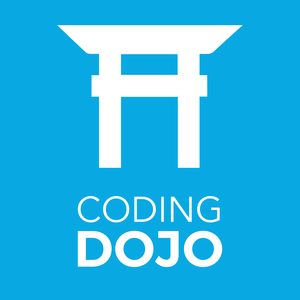
Intelligent Award: Best Overall
Coding Dojo was born as an internal training program for Silicon Valley coders. Their first bootcamp was held in 2012, and since then, the company has become a leader in the coding bootcamp space, with more than 8,000 students completing their programs to date. They offer four software engineering bootcamp options, including on-site and online full-time classes as well as part-time courses. We chose them as our top pick because of their comprehensive curriculum, lifetime career services access, and positive alumni reviews.
What We Like
Coding Dojo gives students a lot of bang for their buck, with a robust curriculum that includes more coding languages than its competitors. The beginner-friendly curriculum starts with programming basics before progressing into Python Full Stack and JavaScript Full Stack. For their last module, students can choose between Java Full Stack or C# Stack. By the end of the 14-week full-time program, students will be prepared to build a variety of projects, including user interfaces, ecommerce websites, login and registration pages, live-chat features, and more.
In addition to giving students the skills they need to find jobs after graduation, Coding Dojo provides a high level of support. Coding Dojo students get lifetime access to the bootcamp’s career services, which include one-on-one coaching, interview preparation, and contract negotiation assistance.
For students who want to learn more about coding before enrolling in a program, Coding Dojo offers a variety of free resources, including free intro to web development and intro to Python classes.
What We Didn’t Like
Unlike many of their competitors, Coding Dojo doesn’t offer an Income Share Agreement option for tuition. Coding Dojo students can pay tuition in a variety of ways, but they all require students to pay at least some money during the program. This may make the program inaccessible for students who need to defer payments until after they’ve found employment in the field.
What Students Are Saying
Coding Dojo has 4.5 stars on Trustpilot and 4.43 stars on Course Report. Students report liking the course because it provides a strong foundation in coding skills and teaches them in a way that is easy to understand. One student wrote, “The learning platform was well-detailed and easy to follow. All of the support was there, and I felt I was definitely set up for success.”
Flatiron School – Software Engineering Bootcamp
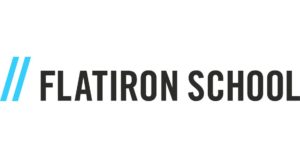
Intelligent Award: Best Self-Directed Course
With 675 hours of industry-vetted curriculum, Flatiron School’s software engineering bootcamp covers the most important technologies that you will need to learn for both front-end and back-end development. One of the best aspects of this program is its flexibility. Students have the option of choosing between full-time, part-time, and self-directed programs. Flatiron School’s self-directed program is unique among bootcamps that usually follow a cohort model, which is why we selected them as our pick for best self-directed program.
What We Like
Although one of the key benefits of coding bootcamps is that students can learn a lot in a minimal amount of time, not everyone can commit to the rigorous schedule that traditional bootcamps demand.
That’s why we like Flatiron School’s unique self-directed program. Students who enroll in this curriculum complete classes in an asynchronous format that allows for maximum flexibility. The bulk of the course content is delivered through prerecorded lessons, although live lectures and office hours give students the opportunity to interact with instructors and peers. There’s also dedicated Slack channels where students can chat with each other and their instructors. Students in the part-time program generally complete the course in 40 weeks, which is still significantly less time than a full degree.
Regardless of whether students choose the part-time or full-time program, they’ll work through a robust curriculum that covers front- and back-end languages, including JavaScript, ReactJS, and Ruby.
What We Didn’t Like
Flatiron School’s payment options are somewhat limited, potentially creating a barrier to access. Students must pay tuition out of pocket, either in one lump sum or in installments, or they must take out a loan. A limited number of scholarships are available, but Flatiron School doesn’t offer an ISA or deferred payment option. Additionally, their curriculum doesn’t currently cover Python, which is a valuable coding language.
What Students Are Saying
Students have given Flatiron School 4.52 stars on Course Report. The company currently only has two reviews on Trustpilot, one positive and one negative. Positive reviews focus on the quality of preparation students say they got from the program in terms of both coding skills and professional development. Negative reviews express dissatisfaction with Flatiron School’s customer service and inconsistency in instructor quality.
Nucamp – Full Stack + Web Development Bootcamp
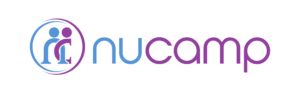
Intelligent Award: Most Flexible
One of the more recently established bootcamps on our list, Nucamp grew out of founder Ludovic Fourrage’s desire to help make coding education more accessible and affordable. Since 2017, the company has expanded to offer several in-person and online bootcamps, including their Full Stack + Web Development bootcamp. This comprehensive program only has one scheduled session per week, which makes it one of the most flexible bootcamps available and supports Fourrage’s mission to open up coding education to more nontraditional students.
What We Like
Unlike most coding bootcamps that require students to attend classes online five or six days a week, or the equivalent of a full-time job, Nucamp’s Full Stack Web + Mobile Development bootcamp only has one required in-person meeting per week on Saturdays. During these workshops, students can interact with instructors and classmates, review the week’s lessons, collaborate on assignments, and more.
Throughout the rest of the week, students learn asynchronously, with video lessons, exercise, quizzes, and hands-on projects. Students can expect to devote about four hours per day to Nucamp work, yet they can choose when and where they complete that work. Overall, the course requires a 22-week commitment, which is similar to other part-time programs.
We also like that Nucamp’s curriculum covers mobile app development as well as web development, another unique aspect of this program. Students will learn front-end and back-end coding languages, as well as auxiliary skills like GitHub, Visual Studio Code, and more.
What We Didn’t Like
Although Nucamp’s flexible, asynchronous delivery method may be ideal for some, students who want a learning experience with more personalized guidance and interaction may find this program isn’t for them. Nucamp’s structure demands that students be self-motivated to complete lessons and assignments on their own time without scheduled class meetings. Notably, their graduation and job placement rates are somewhat lower than other similar bootcamps.
What Students Are Saying
Nucamp has 4.7 stars on Trustpilot and 4.75 stars on Course Report at the time of publication. Several reviewers like Nucamp because it provided them with a solid coding foundation. “Nucamp is a great way to get your feet wet,” writes one student. “They do lots of great examples and the teachers are helpful.” However, some dissatisfied students think the course was too basic to provide students with the comprehensive training they need for coding jobs.
General Assembly – Software Engineering Immersive Course – Best Payment Options
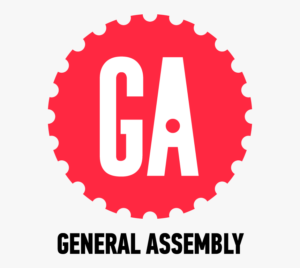
Intelligent Award: Best Payment Options
Since its founding in New York in 2011, General Assembly has grown into a global coding education platform. They offer online and in-person bootcamps in 39 cities and have a network of more than 80,000 alumni worldwide. Named as the Most Innovative Company in Education by Fortune 500 in 2015, General Assembly’s courses include full-time, part-time, and flexible immersive tech bootcamps. Among education platforms, they stand out for making their courses accessible with a variety of payment options.
What We Like
We selected General Assembly as our pick for best payment options because students have a lot of flexibility when it comes to how they pay for their course.
Tuition for students who pay in full upfront is currently $15,950, which is among the lowest tuition fees for coding bootcamps. Students can also spread out payments over three installments. General Assembly also has an ISA option, where students pay after they’ve obtained a job with an annual salary of $40,000 or more. The 10% repayment rate for the ISA is also lower than that used by most other bootcamps. Other financing options include 0% interest loans, scholarships and tuition discounts, GI Bill benefits, and employer sponsorships.
However students choose to pay, they’ll get an immersive learning experience that covers the essential full stack development skills employers are seeking. We like that General Assembly offers several scheduling options, including a 12-week full-time bootcamp, 24-week flex option, and evening and weekend courses designed for students with day jobs.
What We Didn’t Like
One drawback of General Assembly is that, at this time, their online immersive courses are not open to students in certain areas, including Alabama, Wyoming, Wisconsin, Oklahoma and Nebraska. Additionally, there are some limits on their financing options, most of which are only available to students who are enrolled in a full-time immersive course.
What Students Are Saying
Reviews of General Assembly are mixed. The company has 4.31 stars on Course Report and 2.9 stars on Trustpilot, with 8 reviews at the time of publication. Students who had positive experiences note that the program had engaging and informative lessons and skilled instructors. Negative comments included poor experiences with some of the company’s staff, including their financial coordinators and career services.
App Academy – Software Engineering Bootcamp
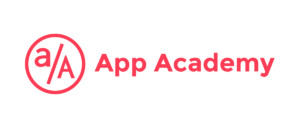
Intelligent Award: Best ISA Program
Founded in 2012, App Academy has trained more than 4,500 students in high-demand programming skills and has helped them secure employment at companies like Slack, Uber, Wayfair, and more. App Academy has a vested interest in helping students get jobs, thanks to their ISA payment model. Students only pay tuition once they’ve obtained a job that meets minimum salary thresholds. This, coupled with App Academy’s comprehensive curriculum, helped them land a spot on our list.
What We Like
For students who need a little extra financial help to complete a coding bootcamp, App Academy is a good option because of their ISA program. This program, which is available to students in App Academy’s 24 Week Software Engineering Immersive course, allows students to defer the cost of their course until they land a job with a salary of $50,000 or more annually. At that point, students pay 15% of their annual salary to App Academy for three years, with a maximum payment amount of $31,000 total.
App Academy prepares students for high-paying coding jobs with a robust curriculum that covers the most essential programming languages, including Python, JavaScript, SQL, React, and more. The curriculum also includes a section on computer science, which dives into data searching and algorithm development, which is a unique feature not always found in bootcamps.
The program culminates with a capstone project that allows students to show off their new skills while building a portfolio to show potential employers.
What We Didn’t Like
One area in which we think App Academy is lacking is its career support services. Most coding bootcamps offer robust career support in the form of interview prep, CV/resume assistance, mentorship, job search assistance, and more. Many incorporate these resources right into the curriculum or offer access to them once a student has graduated. App Academy’s postgraduation career assistance is limited, which could be a potential drawback.
What Students Are Saying
App Academy has 4.67 stars on Course Report, and the company doesn’t have a profile on Trustpilot at this time. Students point out that even though the course is challenging and requires a significant time commitment, they ultimately found it worthwhile because of its rigor and comprehensiveness. Students also point to instructors and teaching assistants for being helpful and available to answer questions and provide guidance.
Fullstack Academy – Grace Hopper Live Online Coding Bootcamp
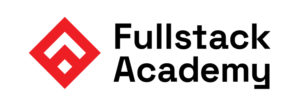
Intelligent Award: Best Inclusivity Program
One of the benefits of coding bootcamps is that they play a role in leveling the playing field in the tech industry by making computer science education more accessible than ever. Fullstack Academy goes a step farther with its Grace Hopper Live Online Coding Bootcamp. Named for American mathematician and computer programming pioneer Grace Hopper, this course is designed to support women and nonbinary coders, with the goal of increasing diversity in the tech industry.
What We Like
Among coding bootcamps, Fullstack Academy’s Grace Hopper Live Online Coding Bootcamp is unique in that it has a focus on creating opportunities for women and nonbinary coders, groups that historically have been marginalized in the tech industry. The program is also open to cis and trans women and non-cisgender individuals.
Students in the program move through three phases — Foundations, Junior, and Senior — as they do a deep-dive into full stack JavaScript. We like that instruction methods vary throughout the phases, with some focused more on lectures and individual study and others emphasizing hands-on, team-based projects.
The final phase of the program incorporates career prep services, including some that are specifically geared toward issues of diversity in the tech industry. Career coaches help students with resume and LinkedIn profile optimization, interview and assessment prep, salary negotiations, and more.
Students in this program are also eligible for a $1,000 need-based scholarship. Other payment options include upfront payment, loans, and veterans benefits.
What We Didn’t Like
A key drawback to Fullstack Academy’s Grace Hopper Live Online Coding Bootcamp is that it only focuses on JavaScript. Even though it is a primary coding language, it’s far from the only one. In order to be as marketable as possible, students should have the broadest skill set possible. Additionally, there are only a few payment options, which can limit accessibility.
What Students Are Saying
Students give Fullstack Academy 4.82 stars on Course Report at the time of publication. The company currently doesn’t have any reviews on Trustpilot. Bootcamp grads say they would recommend Fullstack Academy’s program for its challenging yet empowering curriculum and experienced and friendly faculty. However, some students point out that they felt some of the course content was redundant and that weekly “challenge” modules could have tested their knowledge better.
Tech Elevator – National Live Remote Coding Bootcamp
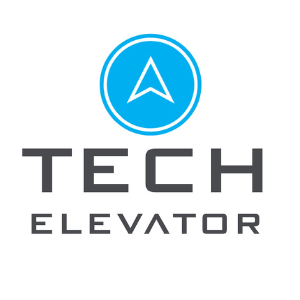
Intelligent Award: Best Career Prep
Tech Elevator was established in 2015 and since then has become a leader in coding education that boasts a 93% graduation rate and a 90% job placement rate. In addition to flexible scheduling options that include full-time and part-time classes, students benefit from a specially designed career prep program that can help them land a job in the tech industry after graduation. With immersive professional development, mentorship opportunities, and an expansive alumni network, we chose Tech Elevator as our pick for best career prep.
What We Like
Finding employment within the tech industry is about more than just having solid coding skills. Students must also know what type of employment opportunities they’re seeking and how to best find and make the most of the opportunities that go their way.
Tech Elevator’s Pathway Program is the career prep component of the platform’s coding bootcamps. Students work with a personal career coach through three professional development phases: self-discovery, personal branding, and networking and job searching. Additional support resources include academic fellows and recent graduates who can provide guidance and networking opportunities to current students. After students complete the program, Tech Elevator continues to provide career support through job search panels, job boards, and more.
This professional development support has likely led to Tech Elevator’s 90% job placement rate, with alumni at a variety of Fortune 500 companies. We also like that Tech Elevator consistently verifies its graduation and job placement outcomes through the CIRR.
What We Didn’t Like
One aspect of Tech Elevator’s curriculum that may be a drawback for some is that students must choose between two curriculum tracks: JavaScript or C#. While this allows for more in-depth training in one of these two programming languages, it may not be ideal for students who are looking to gain a broader coding skill set. Ideally, Tech Elevator would also offer a more comprehensive option that teaches both languages.
What Students Are Saying
TechElevator has a 4.94 star rating on Course Report At the time of publication, and they don’t currently have a profile on Trustpilot. The company’s positive reviews highlight the knowledgeable and supportive faculty and staff and the career development training that the course provides. As one graduate writes, “The curriculum is solid, well organized, and taught in a way that really helped me absorb and retain the information, even at the accelerated pace it was being provided.”
Springboard – Software Engineering Career Track Bootcamp

Intelligent Award: Best Mentorship Program
Springboard’s Software Engineering Bootcamp is an intensive 800-hour program that covers all critical skills for front-end and back-end web development, database management, data structures, and more. Outside of classes, students have the benefit of a 1-on-1 mentorship program with software engineers from companies like Amazon, Google, and more. This unique opportunity to work with industry professionals during the program makes Springboard stand out as the coding bootcamp with the best mentorship program.
What We Like
Most coding bootcamps offer some form of career services, but Springboard goes above and beyond with its mentorship opportunities.
Experienced software engineers provide mentoring to students throughout the program in the form of 1-on-1 meetings, accountability, and on-demand support. To ensure that mentors are prepared with valuable industry knowledge, they must be employed for a minimum of three years in their specific mentorship area. Current mentors hail from companies like Lego, Southwest Airlines, Cisco, and more. Springboard uses a detailed survey to match students and mentors, but students can request a different mentor if they feel their current one isn’t a good fit.
Additional career coaching outside of the mentorship program includes mock interviews, resume and LinkedIn profile assistance, salary negotiation training, and more.
Springboard’s curriculum is comprehensive, covering both front-end and back-end web development skills. Students learn coding languages like JavaScript, Python, Flask, and SQL. Modules end with projects that demonstrate students’ mastery of new coding skills.
What We Didn’t Like
Springboard requires that students have more of a coding foundation than most programs. In order to gain admission into their Software Engineering Career Track, students must already be familiar with JavaScript, HTML, and CSS fundamentals. Students who don’t already have this knowledge will likely need to seek another program that includes these skills in the curriculum or course prework.
What Students Are Saying
Springboard’s Trustpilot score is 4.3 stars, and they have 4.64 stars on Course Report at the time of publication. One graduate of the program wrote, “The best part of the Springboard Software Engineering Career Track is the quality of the curriculum materials. They don’t just teach you the bare minimum to be able to build things – the course gives context, history, and deep technical understanding of why modern web applications are built the way they are.”
Hack Reactor – Software Engineering Coding Bootcamp w/ JavaScript & Python

Intelligent Award: Best Basic Course
With so many programming languages out there, learning them all can feel overwhelming to a complete beginner. Among their many course options, Hack Reactor offers an immersive software engineering coding bootcamp that focuses on two of the most essential coding languages: JavaScript and Python. We believe this program is perfect for beginners who want to start by focusing on the fundamentals before diving deeper into the wide world of coding languages.
What We Like
Although most coding bootcamps are designed for novices without prior coding experience, they try to fit as much information as possible into their curricula, which can overwhelm students. We like that Hack Reactor offers a bootcamp that focuses primarily on Python and JavaScript, which are two of the primary languages coders need to know.
Hack Reactor’s mastery-focused approach means students can retake modules as needed until they feel confident in their knowledge of one skill set before advancing to another. Students also complete projects at the end of each module to put the skills they learned into practice.
The curriculum includes both front- and back-end development skills, so graduates are ready to work in a variety of different settings. Unlike most bootcamps, Hack Reactor builds in off days for students to rest and reflect, which can also help students avoid overwhelm and burnout as they complete the rigorous curriculum.
What We Didn’t Like
As a basics-focused course, Hack Reactor’s Software Engineering Coding Bootcamp w/ JavaScript and Python might not be for everyone. Students who already have some experience with these languages may want to seek a bootcamp that explores more advanced skills. Also, Hack Reactor doesn’t offer a part-time option, which will keep some students from participating in their bootcamps.
What Students Are Saying
Hack Reactor has 4.7 stars on Trustpilot and 4.69 stars on Course Report at the time of publication. Satisfied students praise the program for its well-polished delivery, outstanding student support services, and balance of self-directed learning and instructor guidance. Other students note that they found the required prework helpful, as it gave them an opportunity to confirm their interest in coding before starting the full program.
What to Consider Before Signing Up for a Coding Bootcamp
Your education and career goals
Why do you want to enroll in a coding bootcamp? What is your ultimate career goal? What type of education will best help you achieve it? The answers to these questions will help students determine whether a bootcamp is the right education path for them. Although a coding bootcamp can prepare students for many entry-level jobs, which include web developer, software developer, and IT manager, other jobs may still require a traditional degree. Knowing where you want your career to go will help you work effectively with career support services once you’re enrolled in a bootcamp.
Your experience level
How much coding experience do you have? Most bootcamps are designed to meet the needs of students who have some familiarity with coding, which makes a bootcamp a good choice for beginners and intermediate-level coders. Individuals who have no coding background may find it helpful to enroll in a free intro course, like the one offered by Thinkful, before committing to a paid program. Some coding bootcamps may also have prerequisites for coding experience to ensure that incoming students have a baseline of knowledge before they embark on the program. Students may have to take a skills assessment as part of their application process.
Your budget
Although tuition for coding bootcamps is typically a fraction of the cost of a traditional degree, it can still be several thousand dollars. Because these programs are offered by for-profit companies and aren’t eligible for financial aid, more students pay out of pocket for their bootcamp education. Many bootcamps offer ISAs, under which students pay the full tuition once they are gainfully employed. However, students should be sure to read the fine print, as some agreements may have clauses that mandate students take any job they’re offered or that they find a job within a certain time frame.
Your availability
As the name implies, coding bootcamps are rigorous educational programs designed to be completed in an intensive manner. Most full-time bootcamps require students to be available at least 40 hours a week for 12 to 15 weeks. Even part-time programs still typically require 20 to 25 hours of availability each week. The benefit of this intensive schedule is that students only have to commit to it for a few weeks or months. However, if students want to get the most out of their experience, they need to be prepared to immerse themselves in the world of coding for the duration of the course.
Frequently Asked Questions
What jobs can I get after I complete a coding bootcamp?
Coding bootcamps prepare individuals for a variety of careers in the tech field, including web developer, software application developer, software quality assurance engineer, database administrator, and business intelligence analyst. The Bureau of Labor Statistics predicts that overall employment in computer and information technology occupations will grow 15% by 2031.
Are there free coding bootcamps?
Yes, there are free coding courses available online, including through some of our top picks like Thinkful. However, free courses are typically more of an introduction to coding and don’t include the in-depth training, support, and certification that paid bootcamps provide. Enrolling in a free coding course is a great way to explore whether it is the right path for you, but if you want to learn all the skills necessary for employment as a programmer, a paid course will be your best bet.
How long is the average coding bootcamp?
The length of a coding bootcamp depends on whether students are attending full-time or part-time and whether they are learning synchronously or asynchronously. Most full-time bootcamps can be completed in 12 to 20 weeks, whereas part-time bootcamps may take as long as 48 weeks to finish. Some bootcamps have a self-directed option that allows students to work at their own pace and take as long as they need to complete the course.
Is a coding bootcamp worth it?
The answer to this question depends on a few factors, including where you are in your career and whether you can commit to the rigorous schedule that most bootcamps demand. Coding bootcamps are best suited for students who have minimal or entry-level experience with coding. Experienced coders likely won’t learn anything new from a coding bootcamp. Students also need to be willing and able to devote time and energy to attending classes and completing projects in order to get the most out of their bootcamp.
Other Best Coding Bootcamps Online
Interested in a degree instead?
Learn more about online degrees, their start dates, transferring credits, availability of financial aid, and more by contacting the universities below.

